Geophysical Fluid Dynamics Program Receives AGU Award
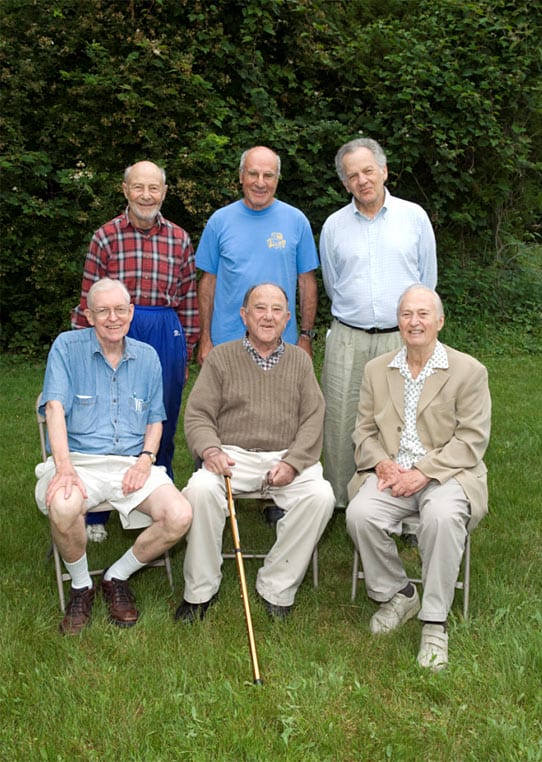 Six of the seven founding members of the Geophysical Fluid Dynamics Program: (front row) Louis Howard, Melvin Stern, Willem Malkus, (back row) Joseph Keller, George Veronis, and Edward Spiegel. The seventh founding member is the late Henry “Hank” Stommel. (Photo by Tom Kleindinst, Woods Hole Oceanographic Institution)
Six of the seven founding members of the Geophysical Fluid Dynamics Program: (front row) Louis Howard, Melvin Stern, Willem Malkus, (back row) Joseph Keller, George Veronis, and Edward Spiegel. The seventh founding member is the late Henry “Hank” Stommel. (Photo by Tom Kleindinst, Woods Hole Oceanographic Institution) July 16, 2008
The founders of the Geophysical Fluid Dynamics Program at the Woods Hole Oceanographic Institution (WHOI) have been selected by their peers as the 2008 recipients of the American Geophysical Union’s Excellence in Geophysical Education Award.
The Geophysical Fluid Dynamics (GFD) Program is an intensive, ten-week summer fellowship that brings together researchers from all over the world to debate how water and other fluids move in the ocean, on planets and stars, and in the atmosphere.
Started in 1959 by two WHOI scientists – George Veronis, now at Yale University, and Willem Malkus, now professor emeritus at the Massachusetts Institute of Technology (MIT) – the program sought to introduce graduate students to basic principles in a new field called geophysical fluid dynamics.
While much has changed in the field since then, the program still follows the highly interactive format put in place by members of the original steering committee: Edward E. Spiegel of Columbia University; Louis Howard of Florida State University; Melvin Stern of Florida State University; Henry Stommel of MIT; and Joseph Keller of Stanford University, in addition to Veronis and Malkus.
The American Geophysical Union (AGU) honored the original steering committee members for “founding, running, and continued participation in the GFD program for 50 years.” Over the years, more than 450 student fellows and over 1000 visitors and have participated in the program.
The Excellence in Geophysical Education Award is given annually to acknowledge outstanding educators who have made a long lasting, positive impact on geophysical education. Veronis, still an active participant in the GFD program, accepted the award on May 29 at the AGU Meeting of the Americas 2008 Joint Assembly in Fort Lauderdale.
“I believe that I can speak for the others as well when I say that it isn’t our arrival at this half-century point that I find so satisfying about the GFD program,” said Veronis. “It’s what each of us has experienced every summer.”
Every summer, the fellowship begins with two weeks of principal lectures focused on the program’s theme; this year’s theme is Perspectives and Challenges in GFD. Past themes have included Tides, Dynamics of the Outer Planets, and the General Circulation of the Atmosphere. Graduate student fellows – usually eight to ten each year – are expected to prepare a summary of those principal lectures, then design and complete an individual research project under the supervision of the staff. At the end of August, students must present a lecture on the results of their individual research.
“The aim of the program is to induce fellows to learn by doing research rather than by taking courses,” Veronis said. “That transition is the most difficult one for graduate students to make.”
To help in that transition, staff work closely with the fellows cooperating on research efforts; they also break down the student-teacher barrier by playing softball together in WHOI’s summer softball league, Veronis said.
Housed in the small, quaint Walsh Cottage on the Woods Hole village campus, even the setting promotes intimacy between students and scientists. Following the highly interactive seminars the program is known for, students can often be found on the cottage’s porch discussing research and working on formulas with senior-level scientists.
“The GFD program has maintained a persistent, positive example of dynamic education by example and apprenticeship throughout its entire lifetime,” said Jack Whitehead, a scientist emeritus in the WHOI Department of Physical Oceanography and long-time organizer of the GFD program. “I wish every student could have such an experience.”
AGU is a worldwide scientific community that advances the understanding of Earth and space for the benefit of humanity. AGU conducts meetings and conferences, publishes journals, books and a weekly newspaper, and sponsors a variety of educational and public information programs.
The Woods Hole Oceanographic Institution is a private, independent organization in Falmouth, Mass., dedicated to marine research, engineering, and higher education. Established in 1930 on a recommendation from the National Academy of Sciences, its primary mission is to understand the oceans and their interaction with the Earth as a whole, and to communicate a basic understanding of the ocean’s role in the changing global environment.
For Immediate Release
Media Relations Office
media@whoi.edu
(508) 289-3340
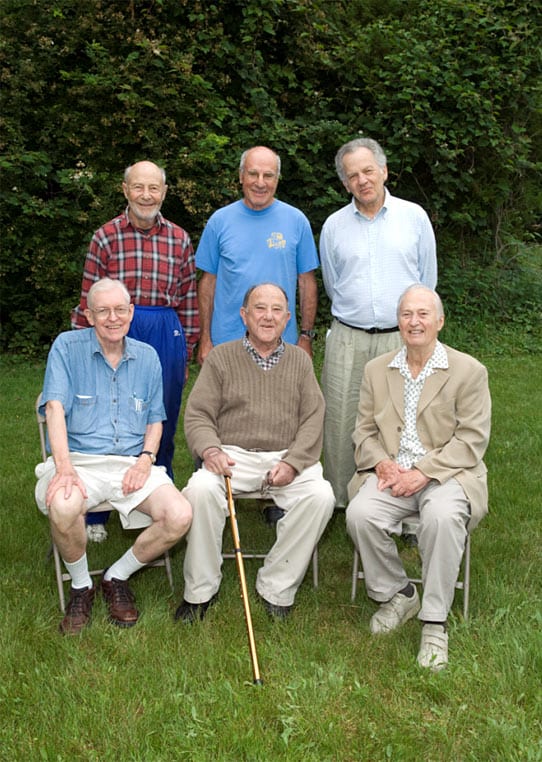
Six of the seven founding members of the Geophysical Fluid Dynamics Program: (front row) Louis Howard, Melvin Stern, Willem Malkus, (back row) Joseph Keller, George Veronis, and Edward Spiegel. The seventh founding member is the late Henry "Hank" Stommel. (Photo by Tom Kleindinst, Woods Hole Oceanographic Institution)
News Release Image

Six of the seven founding members of the Geophysical Fluid Dynamics Program: (front row) Louis Howard, Melvin Stern, Willem Malkus, (back row) Joseph Keller, George Veronis, and Edward Spiegel. The seventh founding member is the late Henry "Hank" Stommel. (Photo by Tom Kleindinst, Woods Hole Oceanographic Institution)
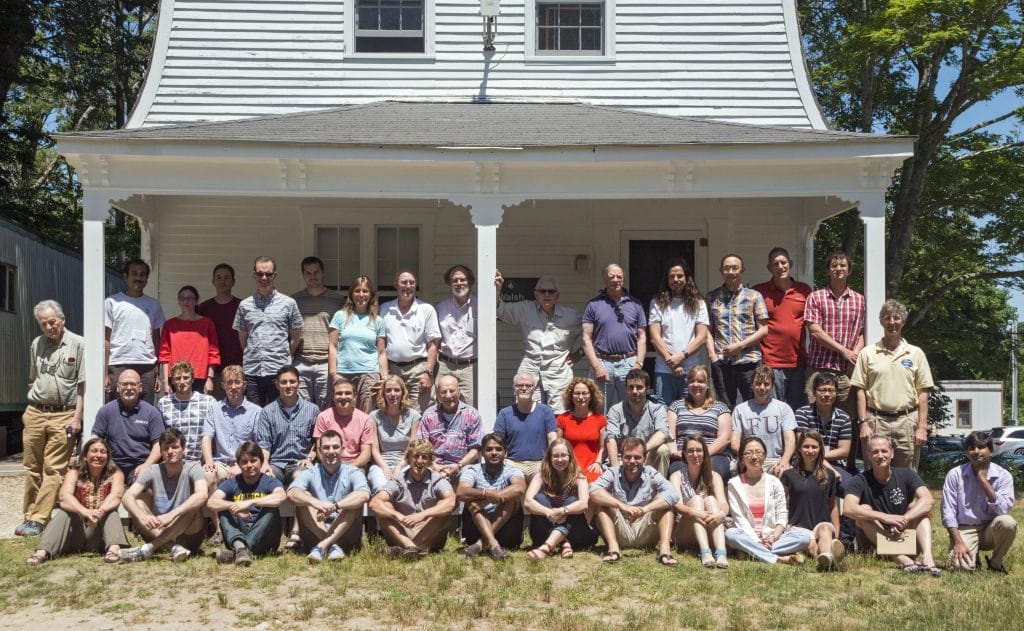
Geophysical Fluid Dynamics 2016 Participants
First Row (left to right): (All seated) Peko Hosoi, Michael Gomez, Christopher Miles, Keaton Burns, Colin Meyer, Sahil Agarwal, Anna Skipper, Jason Olsthoorn, Oceane Richet, Qi Li, Paula Doubrawa, Michael Shelley, Shreyas Mandre
Second Row (left to right): Ed Spiegel (standing), Charlie Doering, David Goluskin, Ian Hewitt, Saverio Spagnolie, Greg Chini, Renske Gelderloos, George Veronis, Jean-Luc Thiffeault, Claudia Adduce, Basile Gallet, Alexis Kaminski, Neil Balmforth, Kenta Ishimoto, Brian von Herzen (standing)
Third Row (left to right): Satyajit Pramanik, Emilie Dressaire, Phil Yecko, Colm-cille Caulfield, Alban Sauret, Claudia Cenedese, Jack Whitehead, Glenn Flierl, Jim Anderson, Joe Pedlosky, Cristobal Arratia, Yuan-Nan Young, Karl Helfrich, Geoff Vasil
Missing from photo: Benjamin Akers, Navid Constantinou, Predrag Cvitanovic, Megan Davies Wykes, Andrew Fowler, Duncan Hewitt, Oliver Jensen, Sungyon Lee, Leo Maas, Amala Mahadevan, Nick Moore, Anand Oza, Thomas Powers, Bruce Sutherland, Grae Worster
News Release Image

Geophysical Fluid Dynamics 2016 Participants
First Row (left to right): (All seated) Peko Hosoi, Michael Gomez, Christopher Miles, Keaton Burns, Colin Meyer, Sahil Agarwal, Anna Skipper, Jason Olsthoorn, Oceane Richet, Qi Li, Paula Doubrawa, Michael Shelley, Shreyas Mandre
Second Row (left to right): Ed Spiegel (standing), Charlie Doering, David Goluskin, Ian Hewitt, Saverio Spagnolie, Greg Chini, Renske Gelderloos, George Veronis, Jean-Luc Thiffeault, Claudia Adduce, Basile Gallet, Alexis Kaminski, Neil Balmforth, Kenta Ishimoto, Brian von Herzen (standing)
Third Row (left to right): Satyajit Pramanik, Emilie Dressaire, Phil Yecko, Colm-cille Caulfield, Alban Sauret, Claudia Cenedese, Jack Whitehead, Glenn Flierl, Jim Anderson, Joe Pedlosky, Cristobal Arratia, Yuan-Nan Young, Karl Helfrich, Geoff Vasil
Missing from photo: Benjamin Akers, Navid Constantinou, Predrag Cvitanovic, Megan Davies Wykes, Andrew Fowler, Duncan Hewitt, Oliver Jensen, Sungyon Lee, Leo Maas, Amala Mahadevan, Nick Moore, Anand Oza, Thomas Powers, Bruce Sutherland, Grae Worster
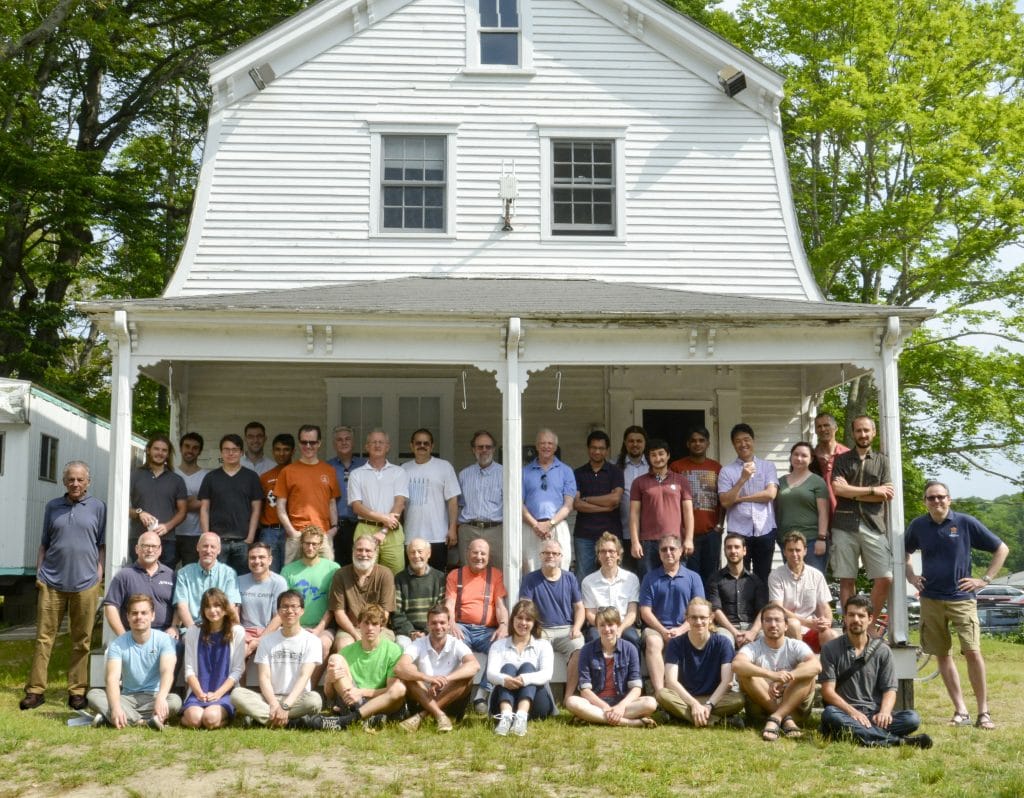
Geophysical Fluid Dynamics 2015 Participants
First Row (left to right): (all sitting) Tom Beucler, Florence Marcotte, Gunnar Peng, Chris Spalding, Giovanni Fantuzzi, Yana Babieva, Anna Fitzmaurice, Tom Eaves, Cesar Rocha, Andre Souza
Second Row (left to right): Ed Spiegel (standing). Sitting: Charlie Doering, John Wettlaufer, Greg Chini, David Goluskin, Phil Morrison, Joe Keller, George Veronis, Jean-Luc Thiffeault, Henk Dijkstra, Jeff Weiss, Filippo Guarnieri, Neil Balmforth, Oliver Buhler (standing)
Third Row ((left to right): Gregory Wagner, Basile Gallet, Christopher Miles, Keatan Burns, Akarsh Simha, Colm Caulfield, John Marshall, Bill Young, Dhruba Mitra, Glenn Flierl, Joe Pedlosky, Srikanth Toppaladoddi, Andrew Wells, Georgy Manucharyan, Sahil Agarwal, Woosok Moon, Amanda O'Rourke, Rich Kerswell, Fabio DelSordo
News Release Image

Geophysical Fluid Dynamics 2015 Participants
First Row (left to right): (all sitting) Tom Beucler, Florence Marcotte, Gunnar Peng, Chris Spalding, Giovanni Fantuzzi, Yana Babieva, Anna Fitzmaurice, Tom Eaves, Cesar Rocha, Andre Souza
Second Row (left to right): Ed Spiegel (standing). Sitting: Charlie Doering, John Wettlaufer, Greg Chini, David Goluskin, Phil Morrison, Joe Keller, George Veronis, Jean-Luc Thiffeault, Henk Dijkstra, Jeff Weiss, Filippo Guarnieri, Neil Balmforth, Oliver Buhler (standing)
Third Row ((left to right): Gregory Wagner, Basile Gallet, Christopher Miles, Keatan Burns, Akarsh Simha, Colm Caulfield, John Marshall, Bill Young, Dhruba Mitra, Glenn Flierl, Joe Pedlosky, Srikanth Toppaladoddi, Andrew Wells, Georgy Manucharyan, Sahil Agarwal, Woosok Moon, Amanda O'Rourke, Rich Kerswell, Fabio DelSordo
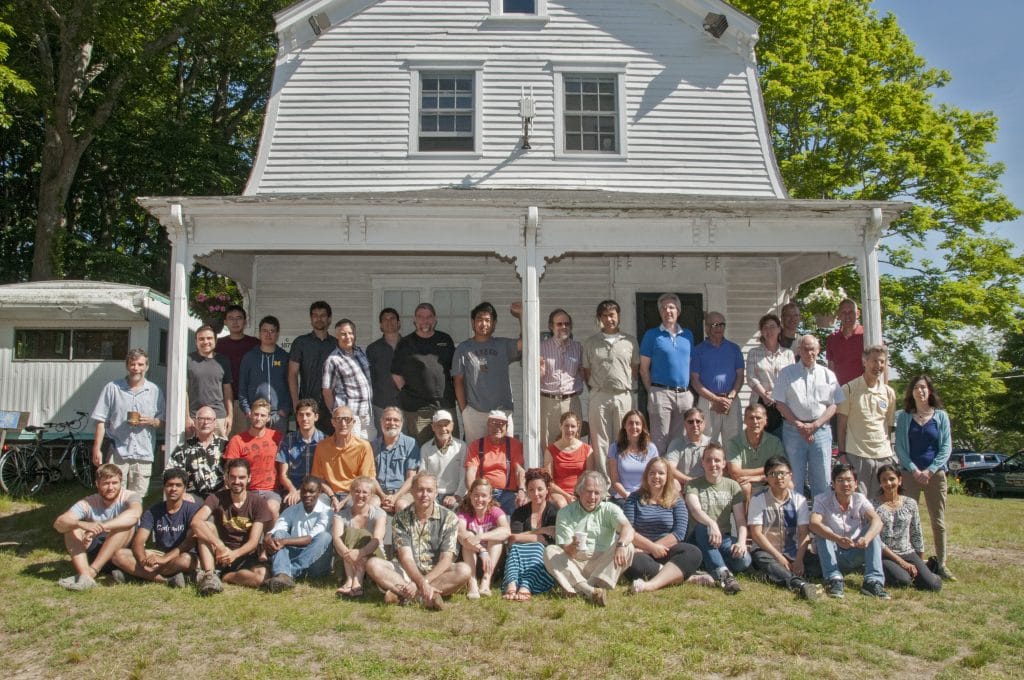
Geophysical Fluid Dynamics 2014 Participants
First row (left to right): Joern Callies, Jim Thomas, Geoff Stanley, Daniel Mukiibi, Erica Rosenblum, Geoff Vallis, Paige Martin, Ashley Payne, Kerry Emanuel, Alexis Kaminski, Joe Fitzgerald, Shineng Hu, Junyi Chai, Amala Mahadevan
Second row (left to right): Stephen Meacham (standing), Charles Doering, David Goluskin, Santiago Benavides, Andy Ingersoll, Phil Morrison, Joseph Keller, George Veronis, Adele Morrison, Simona Bordoni, Jeffrey Weiss, Richard Kerswell, Norman Lebovitz, Brian von Hersen, Mary-Louise Timmermans
Third row (left to right): Greg Chini, Lei Wang, Christopher Miles, Andre Souza, Ted Johnson, Martin Jucker, Lenny Smith, Da Yang, Glenn Flierl, Antonello Provenzale, Raffaele Ferrari, Joe Pedlosky, Beth Wingate, Bradley Hubbard-Nelson, Karl Helfrich
Missing from photo: Ryan Abernathy, Hussein Aluie, Kyle Armour, Carlo Barbante, Yana Bebieva, Cecilia Bitz, Colm-cille Caulfield, Paola Cessi, Susanna Corti, Predrag Cvitanovic, Hailiang Du, Baylor Fox-Kemper, Pierre Gentine, Peter Huybers, Malte Jansen, Zhiming Kuang, John Marshall, Caroline Muller, Gerard Roe, Hesam Salehipour, Tapio Schneider, Tiffany Shaw, Nicole Shebley, Adam Sobel, Mike Spall, Ed Spiegel, Fiamma Straneo, Lynne Talley, John Taylor, Jean-Luc Thiffeault, Andy Thompson, Eli Tziperman, Jost von Hardenberg, Brian White, Phil Yecko, Bill Young, Mengnan Zhao
News Release Image

Geophysical Fluid Dynamics 2014 Participants
First row (left to right): Joern Callies, Jim Thomas, Geoff Stanley, Daniel Mukiibi, Erica Rosenblum, Geoff Vallis, Paige Martin, Ashley Payne, Kerry Emanuel, Alexis Kaminski, Joe Fitzgerald, Shineng Hu, Junyi Chai, Amala Mahadevan
Second row (left to right): Stephen Meacham (standing), Charles Doering, David Goluskin, Santiago Benavides, Andy Ingersoll, Phil Morrison, Joseph Keller, George Veronis, Adele Morrison, Simona Bordoni, Jeffrey Weiss, Richard Kerswell, Norman Lebovitz, Brian von Hersen, Mary-Louise Timmermans
Third row (left to right): Greg Chini, Lei Wang, Christopher Miles, Andre Souza, Ted Johnson, Martin Jucker, Lenny Smith, Da Yang, Glenn Flierl, Antonello Provenzale, Raffaele Ferrari, Joe Pedlosky, Beth Wingate, Bradley Hubbard-Nelson, Karl Helfrich
Missing from photo: Ryan Abernathy, Hussein Aluie, Kyle Armour, Carlo Barbante, Yana Bebieva, Cecilia Bitz, Colm-cille Caulfield, Paola Cessi, Susanna Corti, Predrag Cvitanovic, Hailiang Du, Baylor Fox-Kemper, Pierre Gentine, Peter Huybers, Malte Jansen, Zhiming Kuang, John Marshall, Caroline Muller, Gerard Roe, Hesam Salehipour, Tapio Schneider, Tiffany Shaw, Nicole Shebley, Adam Sobel, Mike Spall, Ed Spiegel, Fiamma Straneo, Lynne Talley, John Taylor, Jean-Luc Thiffeault, Andy Thompson, Eli Tziperman, Jost von Hardenberg, Brian White, Phil Yecko, Bill Young, Mengnan Zhao
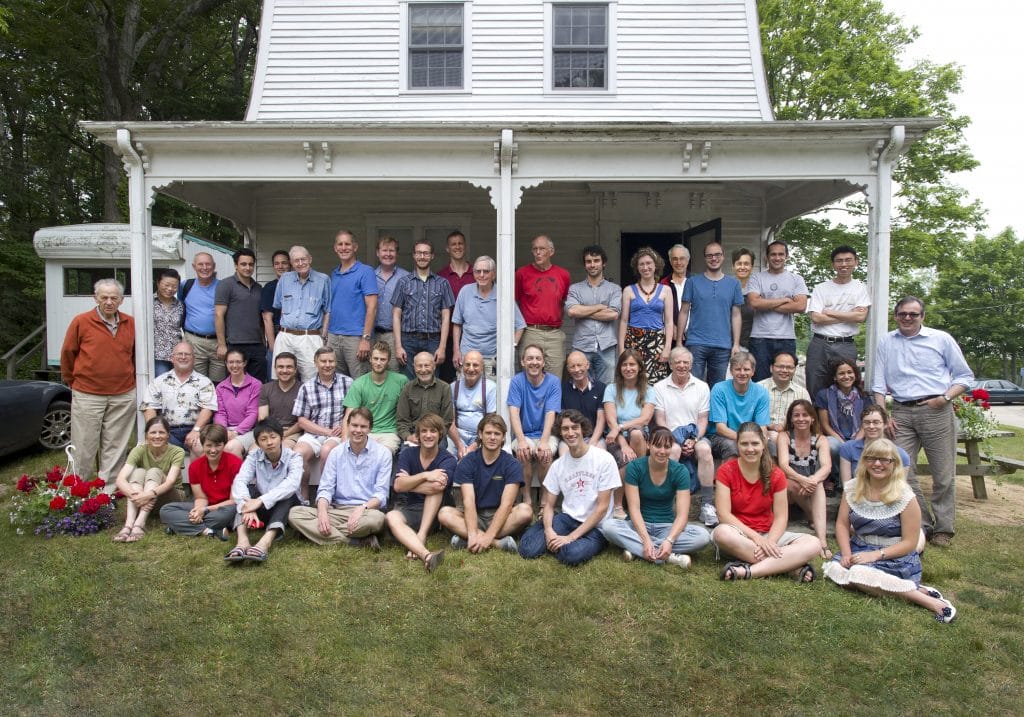
2013 Geophysical Fluid Dynamics Participants
First row (left to right): Sarah Gille, Catherine Jones, Yuki Yasuda, Ton van den Bremer, Tobias Bischoff, Greg Wagner, Daniel Lecoanet, Kate Snow, Karin van der Wiel, Pascale Garaud, Varvara Zemskova, Kelly Ogden
Second row (left to right): Charles Doering, Rosie Oglethorpe, Greg Chini, Ted Johnson, David Goluskin, Joseph Keller, George Veronis, Stefan Llewellyn Smith, Paul Linden, Claudia Cenedesse, Joseph Pedlosky, Eric Chassignet, Gordon Zhang, Luisa Ottolenghi, Oliver Buhler
Third row (left to right): Ed Spiegel, Jie Yu, Jack Whitehead, George Hagstrom, Phil Yecko, Louis Howard, Karl Helfrich, Bruce Sutherland, Brian White, Rich Kerswell, Jim Anderson, Peter Rhines, Basile Gallet, Rebecca Dell, John Gille, Cedric Beaume, Sonya Legg, Dhruv Balwada, Zhiming Kuang
Missing from photo: Gualtiero Badin, Neil Balmforth, Xavier Carton, Colm-cille Caulfield, Jean-March Chomas, Predrag Cvitanovic, Baylor Fox-Kemper, Ross Griffiths, Andrew Hogg, Keith Julien, Richard Katz, Norman Lebovitz, Ali Mashayekhi, Eckart Meiburg, Paul Milewski, Philip Morrison, Tamay Ozgokmen, Michael Patterson, Andrew Stewart, Jean-Luc Thiffeault, Andrew Thompson, Andreas Thurnherr, Laurette Tuckerman, Andrew Woods
News Release Image

2013 Geophysical Fluid Dynamics Participants
First row (left to right): Sarah Gille, Catherine Jones, Yuki Yasuda, Ton van den Bremer, Tobias Bischoff, Greg Wagner, Daniel Lecoanet, Kate Snow, Karin van der Wiel, Pascale Garaud, Varvara Zemskova, Kelly Ogden
Second row (left to right): Charles Doering, Rosie Oglethorpe, Greg Chini, Ted Johnson, David Goluskin, Joseph Keller, George Veronis, Stefan Llewellyn Smith, Paul Linden, Claudia Cenedesse, Joseph Pedlosky, Eric Chassignet, Gordon Zhang, Luisa Ottolenghi, Oliver Buhler
Third row (left to right): Ed Spiegel, Jie Yu, Jack Whitehead, George Hagstrom, Phil Yecko, Louis Howard, Karl Helfrich, Bruce Sutherland, Brian White, Rich Kerswell, Jim Anderson, Peter Rhines, Basile Gallet, Rebecca Dell, John Gille, Cedric Beaume, Sonya Legg, Dhruv Balwada, Zhiming Kuang
Missing from photo: Gualtiero Badin, Neil Balmforth, Xavier Carton, Colm-cille Caulfield, Jean-March Chomas, Predrag Cvitanovic, Baylor Fox-Kemper, Ross Griffiths, Andrew Hogg, Keith Julien, Richard Katz, Norman Lebovitz, Ali Mashayekhi, Eckart Meiburg, Paul Milewski, Philip Morrison, Tamay Ozgokmen, Michael Patterson, Andrew Stewart, Jean-Luc Thiffeault, Andrew Thompson, Andreas Thurnherr, Laurette Tuckerman, Andrew Woods
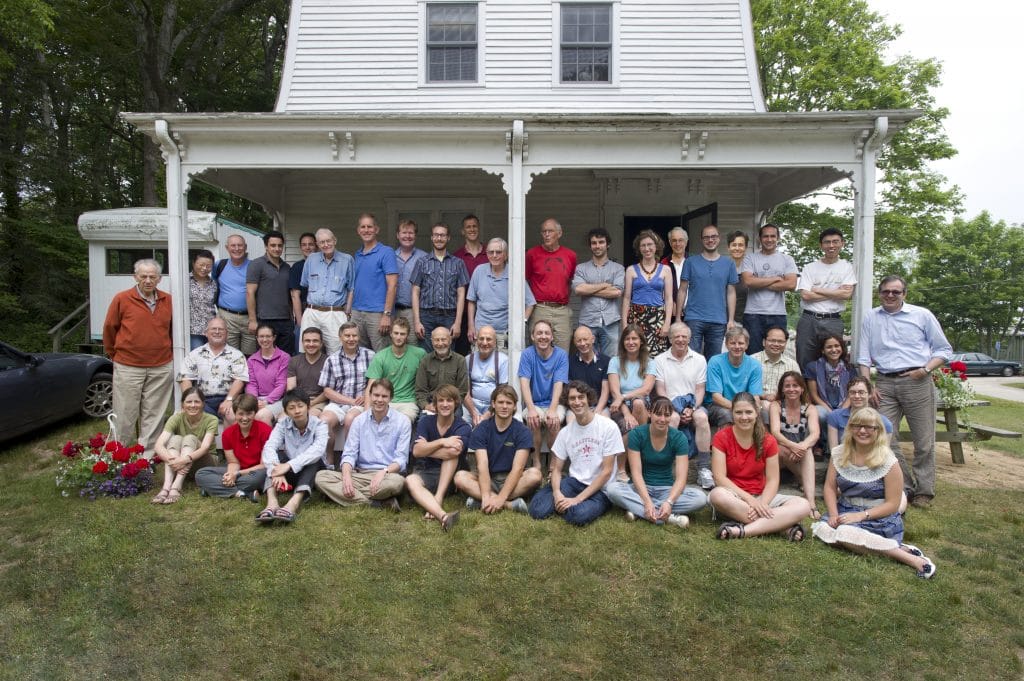
2012 Geophysical Fluid Dynamics Participants
First row (seated on ground): David Goluskin, Vamsi Challamalla, Srikanth Toppaladoddi, Alban Sauret, Pedram Hassanzadeh, Cedric Beaume, Felicity Graham, Duncan Hewitt, Rosalind Oglethorpe, Bevin Maltsby, Yuan Guo
Second row (seated): Charles Doering, Norman Lebovitz, unknown, Philip Morrison, Joseph Keller, George Veronis, Jeffrey Weiss, Edgar Knobloch, Ali Mashayekhi, Pascale Garaud, Claudia Cenedese, Oliver Buhler, Matthew Chantry
Third row: Edward Spiegel (standing), Tiffany Shaw, Greg Chini, Colm Caulfield, unknown, Shreyas Mandre, Tobias Schneider, Georgy Manucharyan, James Anderson, Neil Balmforth, Robert Deegan, Matthew Salewski
Fourth row: Raffaele Ferrari, Woosok Moon (hidden) Glenn Flierl, John Gibson, unknown, Michael Proctor, Stefan Linz, Gualtiero Badin, Nicolas Grisouard, L. Mahadevan, Rich Kerswell, Keith Julien, Onno Bokhove
Not pictured: Helmut Baumert, Javier Beron-Viera, Howard Bluestein, Sergei Chernyshenko, Predrag Cvitanovic, Diego Del-Castillo-Negrete, Navid Dianati-Maleki, Francesco Fedele, Nicolas Grisouard, George Hagstrom, George Haller, Miranda Holmes-Cerfon, Josefina Olascoago, Wenbo Tang, Anthony Thornton, Geoffrey Vasil, Djoko Wirosoetisno
News Release Image

2012 Geophysical Fluid Dynamics Participants
First row (seated on ground): David Goluskin, Vamsi Challamalla, Srikanth Toppaladoddi, Alban Sauret, Pedram Hassanzadeh, Cedric Beaume, Felicity Graham, Duncan Hewitt, Rosalind Oglethorpe, Bevin Maltsby, Yuan Guo
Second row (seated): Charles Doering, Norman Lebovitz, unknown, Philip Morrison, Joseph Keller, George Veronis, Jeffrey Weiss, Edgar Knobloch, Ali Mashayekhi, Pascale Garaud, Claudia Cenedese, Oliver Buhler, Matthew Chantry
Third row: Edward Spiegel (standing), Tiffany Shaw, Greg Chini, Colm Caulfield, unknown, Shreyas Mandre, Tobias Schneider, Georgy Manucharyan, James Anderson, Neil Balmforth, Robert Deegan, Matthew Salewski
Fourth row: Raffaele Ferrari, Woosok Moon (hidden) Glenn Flierl, John Gibson, unknown, Michael Proctor, Stefan Linz, Gualtiero Badin, Nicolas Grisouard, L. Mahadevan, Rich Kerswell, Keith Julien, Onno Bokhove
Not pictured: Helmut Baumert, Javier Beron-Viera, Howard Bluestein, Sergei Chernyshenko, Predrag Cvitanovic, Diego Del-Castillo-Negrete, Navid Dianati-Maleki, Francesco Fedele, Nicolas Grisouard, George Hagstrom, George Haller, Miranda Holmes-Cerfon, Josefina Olascoago, Wenbo Tang, Anthony Thornton, Geoffrey Vasil, Djoko Wirosoetisno
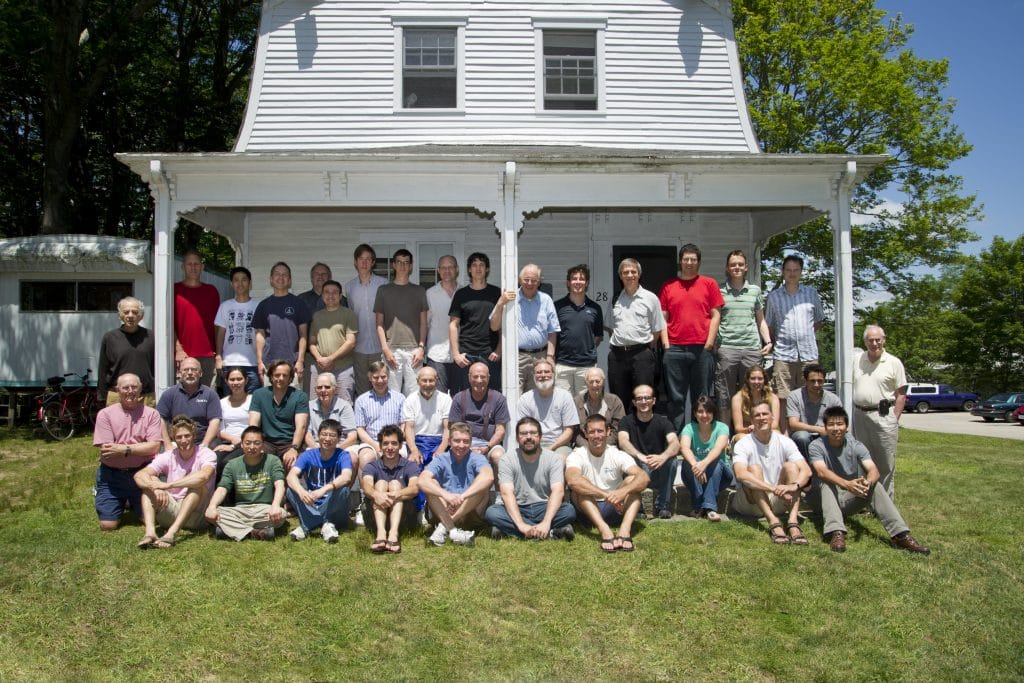
2011 Geophysical Fluid Dynamics Participants
First row (left to right): David Goluskin, Chao Ma, Zhan Wang, Giuilio Mariotti, Fabian Waleffe, Martin Hoecker-Martinez, Matthew Alford
Second row (left to right): Jack Whitehead (seated), Charles Doering, Evelyn Lunasin, Diego Del-Castillo-Negrete, James Anderson, Edward Johnson, Joseph Keller, George Veronis, Philip Morrison, Willem Malkus, _?___, Lindsey Ritchie, Adele Morrison, Richard Kerswell, George Hagstron, Keiji Kimura, Norman Lebovitz (standing)
Third row (left to right): Ed Spiegel (standing), Karl Helfrich, ___?___, Stefan Llewellyn-Smith, Philip Hall, Greg Chini, Jan Feys, Andrew Crosby, John Gibson, John Platt, Friedrich Busse, Tobias Schneider, Sergei Chernyshenko, Samuel Potter, Matthew Chantry, Robert Deegan
News Release Image

2011 Geophysical Fluid Dynamics Participants
First row (left to right): David Goluskin, Chao Ma, Zhan Wang, Giuilio Mariotti, Fabian Waleffe, Martin Hoecker-Martinez, Matthew Alford
Second row (left to right): Jack Whitehead (seated), Charles Doering, Evelyn Lunasin, Diego Del-Castillo-Negrete, James Anderson, Edward Johnson, Joseph Keller, George Veronis, Philip Morrison, Willem Malkus, _?___, Lindsey Ritchie, Adele Morrison, Richard Kerswell, George Hagstron, Keiji Kimura, Norman Lebovitz (standing)
Third row (left to right): Ed Spiegel (standing), Karl Helfrich, ___?___, Stefan Llewellyn-Smith, Philip Hall, Greg Chini, Jan Feys, Andrew Crosby, John Gibson, John Platt, Friedrich Busse, Tobias Schneider, Sergei Chernyshenko, Samuel Potter, Matthew Chantry, Robert Deegan
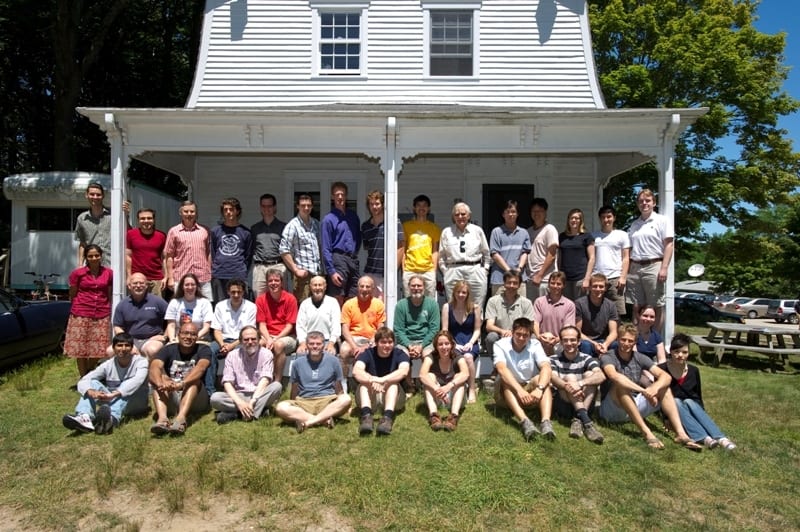
2010 Geophysical Fluid Dynamics Participants
First row, seated(L/R): Shreyas Mandre, Anubhab Roy, Glenn Flierl, Jean-Luc Thiffeault, Sam Pegler, Renske Gelderloos, Michael Allshouse, Navid Dianati Malekhi, David Goluskin, Amanda O’Rourke, Kiori Obuse
Second row (L/R): Amala Mahadevan (standing), Charles Doering, Sarah Matz, George Hagstrom, Joseph LaCasce, Joseph Keller, George Veronis, Philip Morrison, Emma Thompson, Antonello Provenzale, Neil Balmforth, Jim McElwaine
Back row (L/R): John Taylor, Greg Chini, Edward Johnson, Gualtiero Badin, Colm-cille Caulfield, Andrew Stewart, Onno Bokhove, Anthony Fragoso, George Lin, James Anderson, Yue-Kin Tsang, Woosok Moon, Tiffany Shaw, Georgy Manucharyan, Daniel Jones
Not pictured: Andrew Belmonte, Guido Bofetta, Annalisa Bracco, Kenneth Breuer, Greg Buck, Predrag Cvitanovic, Paul Dellar, Raffaele Ferrari, Matt Finn, Andrew Fowler, Baylor Fox-Kemper, Michael Graham, Karl Helfrich, Ian Hewitt, Annette Hosoi, Shane Keating, Eric Kunze, Norman Lebovitz, Marina Levy, Yiping Ma, Lakshminarayanan Mahedevan, Willem Malkus, Meredith Metzger, Stephen Morris, Shavarsh Nurijanyan, Francesco Paparella, Tom Peacock, Tom Powers, Amy Shen, Alexander Soloviev, Ed Spiegel, Roman Stocker, Bruce Sutherland, Jeffrey Weiss
News Release Image

2010 Geophysical Fluid Dynamics Participants
First row, seated(L/R): Shreyas Mandre, Anubhab Roy, Glenn Flierl, Jean-Luc Thiffeault, Sam Pegler, Renske Gelderloos, Michael Allshouse, Navid Dianati Malekhi, David Goluskin, Amanda O’Rourke, Kiori Obuse
Second row (L/R): Amala Mahadevan (standing), Charles Doering, Sarah Matz, George Hagstrom, Joseph LaCasce, Joseph Keller, George Veronis, Philip Morrison, Emma Thompson, Antonello Provenzale, Neil Balmforth, Jim McElwaine
Back row (L/R): John Taylor, Greg Chini, Edward Johnson, Gualtiero Badin, Colm-cille Caulfield, Andrew Stewart, Onno Bokhove, Anthony Fragoso, George Lin, James Anderson, Yue-Kin Tsang, Woosok Moon, Tiffany Shaw, Georgy Manucharyan, Daniel Jones
Not pictured: Andrew Belmonte, Guido Bofetta, Annalisa Bracco, Kenneth Breuer, Greg Buck, Predrag Cvitanovic, Paul Dellar, Raffaele Ferrari, Matt Finn, Andrew Fowler, Baylor Fox-Kemper, Michael Graham, Karl Helfrich, Ian Hewitt, Annette Hosoi, Shane Keating, Eric Kunze, Norman Lebovitz, Marina Levy, Yiping Ma, Lakshminarayanan Mahedevan, Willem Malkus, Meredith Metzger, Stephen Morris, Shavarsh Nurijanyan, Francesco Paparella, Tom Peacock, Tom Powers, Amy Shen, Alexander Soloviev, Ed Spiegel, Roman Stocker, Bruce Sutherland, Jeffrey Weiss
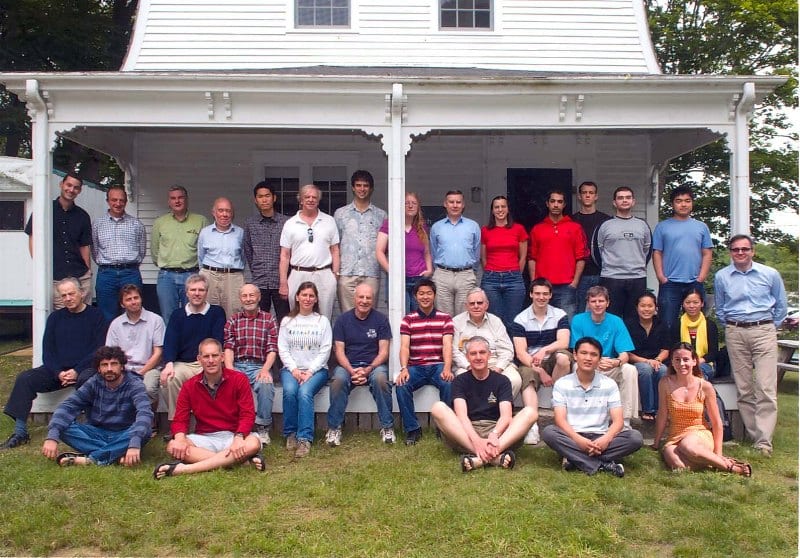
2009 Geophysical Fluid Dynamics Participants
First row, seated (L/R): Nicholas Grisouard, Karl Helfrich, Harvey Segur, Andong He, Pascale Garaud
Second row (L/R): Ed Spiegel, Neil Balmforth, Raffaele Ferrari, Joseph Keller, Claudia Cenedese, George Veronis, Daisuke Takagi, James Anderson, Andrew Stewart, Eric Chassignet, Erinna Chen, Xujing Jia Davis, Oliver Buhler (standing)
Back row (L/R): John Taylor, Alexander Balk, John Marshall, Roger Grimshaw, Hiroki Yamamoto, Joseph Pedlosky, Michael Bates, Adrienne Traxler, Edward Johnson, Helene Scolan, Alireza Mashayekhi, unknown, unknown, Yiping Ma
Not pictured: Triantaphyllos Akylas, Hassan Aref, Friedrich Busse, Colm-cille Caulfield, Paola Cessi, Charles Doering, Gavin Esler, Alexey Fedorov, Johannes Gemmrich, Miranda Holmes-Cerfon, Louis Howard, Kevin Lamb, Philip Morrison, Anatoly Odulo, Lev Ostrovsky, Nathan Paldor, Geoff Spedding, Bruce Sutherland, Esteban Tabak, John Wettlaufer, John Whitehead, William Young
News Release Image

2009 Geophysical Fluid Dynamics Participants
First row, seated (L/R): Nicholas Grisouard, Karl Helfrich, Harvey Segur, Andong He, Pascale Garaud
Second row (L/R): Ed Spiegel, Neil Balmforth, Raffaele Ferrari, Joseph Keller, Claudia Cenedese, George Veronis, Daisuke Takagi, James Anderson, Andrew Stewart, Eric Chassignet, Erinna Chen, Xujing Jia Davis, Oliver Buhler (standing)
Back row (L/R): John Taylor, Alexander Balk, John Marshall, Roger Grimshaw, Hiroki Yamamoto, Joseph Pedlosky, Michael Bates, Adrienne Traxler, Edward Johnson, Helene Scolan, Alireza Mashayekhi, unknown, unknown, Yiping Ma
Not pictured: Triantaphyllos Akylas, Hassan Aref, Friedrich Busse, Colm-cille Caulfield, Paola Cessi, Charles Doering, Gavin Esler, Alexey Fedorov, Johannes Gemmrich, Miranda Holmes-Cerfon, Louis Howard, Kevin Lamb, Philip Morrison, Anatoly Odulo, Lev Ostrovsky, Nathan Paldor, Geoff Spedding, Bruce Sutherland, Esteban Tabak, John Wettlaufer, John Whitehead, William Young
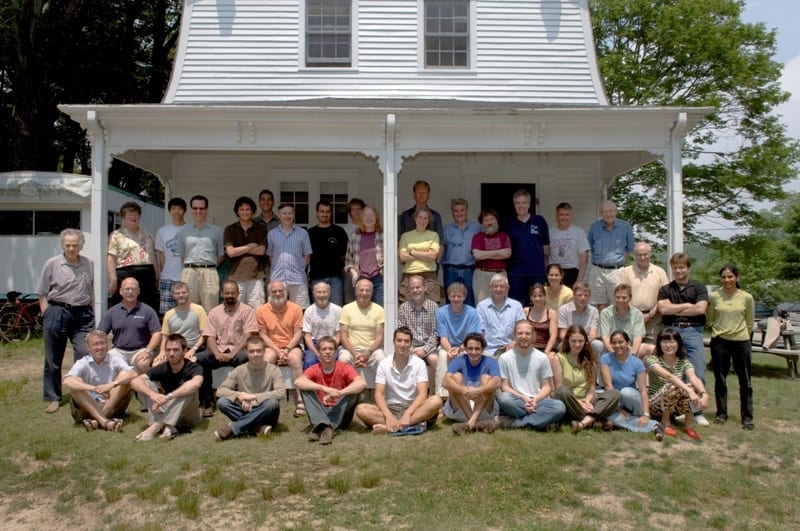
2008 Geophysical Fluid Dynamics Participants
First row, seated (L/R): Ian Hewitt, Christope Gissinger, Toby Wood, Malte Jansen, Sylvain Barbot, George Hagstrom, Christopher Cawthorn, Celine Guervilly, Amrita Shravat, Yutian Wu
Second row (L/R): Ed Spiegel (standing); Charles Doering; Jean-Luc Thiffeault; L. Mahadevan; Herbert Huppert; Joe Keller; George Veronis; Larry Pratt; Eric Chassignet; Steve Childress; Pascale Garaud; Lucia Bunge; Johan Nilsson; Neil Balmforth; Norman Lebovitz (standing); Timour Radko (standing); Amala Mahadevan (standing).
Back row (L/R): Penny Foster, Xiaoqian Zhang; Colm-cille Caulfield; Michael Brenner; John Taylor; Ted Johnson; Filippo Maimone; (unknown); Adrienne Traxler; Jennifer MacKinnon; Jeroen Hazewinkel; John Marshall; Ray Pierrehumbert; Bill Dewar; Lou Howard
News Release Image

2008 Geophysical Fluid Dynamics Participants
First row, seated (L/R): Ian Hewitt, Christope Gissinger, Toby Wood, Malte Jansen, Sylvain Barbot, George Hagstrom, Christopher Cawthorn, Celine Guervilly, Amrita Shravat, Yutian Wu
Second row (L/R): Ed Spiegel (standing); Charles Doering; Jean-Luc Thiffeault; L. Mahadevan; Herbert Huppert; Joe Keller; George Veronis; Larry Pratt; Eric Chassignet; Steve Childress; Pascale Garaud; Lucia Bunge; Johan Nilsson; Neil Balmforth; Norman Lebovitz (standing); Timour Radko (standing); Amala Mahadevan (standing).
Back row (L/R): Penny Foster, Xiaoqian Zhang; Colm-cille Caulfield; Michael Brenner; John Taylor; Ted Johnson; Filippo Maimone; (unknown); Adrienne Traxler; Jennifer MacKinnon; Jeroen Hazewinkel; John Marshall; Ray Pierrehumbert; Bill Dewar; Lou Howard
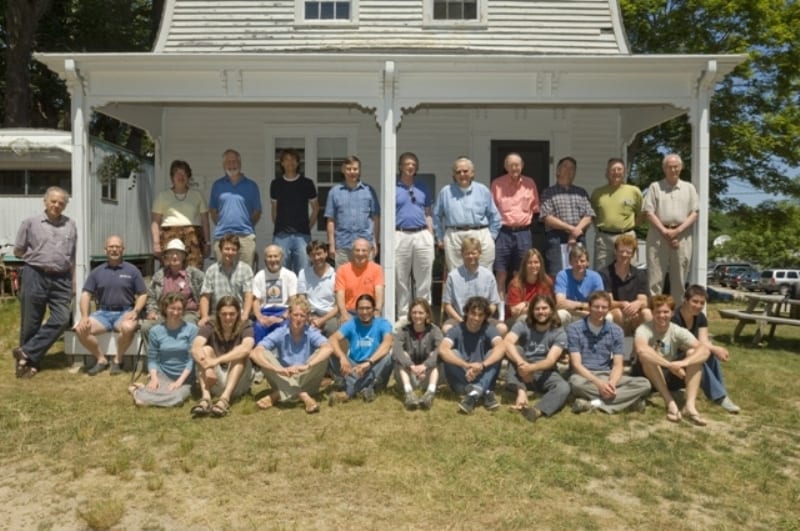
2007 Geophysical Fluid Dynamics Participants
First row, seated (L/R): Rebecca Dell; Andrew Wells; Jeroen Hazewinkel; Angel Ruiz-Angulo; Miranda Holmes; Basile Gallet; Frederic Laliberte; Henrik van Lengerich; Jan Zika; Iva Kavcic.
Second row (L/R): Ed Spiegel (standing); Charles Doering; Willem Malkus; Vitalii Sheremet; Joe Keller; Antonello Provenzale; George Veronis; Erik Anderson; Claudia Cenedese; Eric Chassignet; Onno Bokhove.
Back row (L/R): Penny Foster, Steve Thorpe; Gregory Buck; Ted Johnson; Joe Pedlosky; Jim Anderson; Lou Howard; Bill Dewar; Jack Whitehead; Norm Lebovitz.
Not pictured: Benjamin Akers, Andrew Belmonte, Gregory Chini, Predrag Cvitanovic, Robert Ecke, James Edson, Kerry Emanuel, David Farmer, Stephan Fauve, Harinda Fernando, Glenn Flierl, John Gibson, Karl Helfrich, Joseph Kuehl, Joseph LaCasce, Steven Lentz, Amala Mahadevan, Brad Marston, John McHugh, W. Ken Melville, Philip Morrison, Takahide Okabe, Alexander Soloviev, Georgi Sutyrin, Nobuhiro, Mary-Louise Timmermans, Eli Tziperman, Lars Umlauf, Divakar Viswanath, Carl Wunsch, Philip Yecko
News Release Image

2007 Geophysical Fluid Dynamics Participants
First row, seated (L/R): Rebecca Dell; Andrew Wells; Jeroen Hazewinkel; Angel Ruiz-Angulo; Miranda Holmes; Basile Gallet; Frederic Laliberte; Henrik van Lengerich; Jan Zika; Iva Kavcic.
Second row (L/R): Ed Spiegel (standing); Charles Doering; Willem Malkus; Vitalii Sheremet; Joe Keller; Antonello Provenzale; George Veronis; Erik Anderson; Claudia Cenedese; Eric Chassignet; Onno Bokhove.
Back row (L/R): Penny Foster, Steve Thorpe; Gregory Buck; Ted Johnson; Joe Pedlosky; Jim Anderson; Lou Howard; Bill Dewar; Jack Whitehead; Norm Lebovitz.
Not pictured: Benjamin Akers, Andrew Belmonte, Gregory Chini, Predrag Cvitanovic, Robert Ecke, James Edson, Kerry Emanuel, David Farmer, Stephan Fauve, Harinda Fernando, Glenn Flierl, John Gibson, Karl Helfrich, Joseph Kuehl, Joseph LaCasce, Steven Lentz, Amala Mahadevan, Brad Marston, John McHugh, W. Ken Melville, Philip Morrison, Takahide Okabe, Alexander Soloviev, Georgi Sutyrin, Nobuhiro, Mary-Louise Timmermans, Eli Tziperman, Lars Umlauf, Divakar Viswanath, Carl Wunsch, Philip Yecko
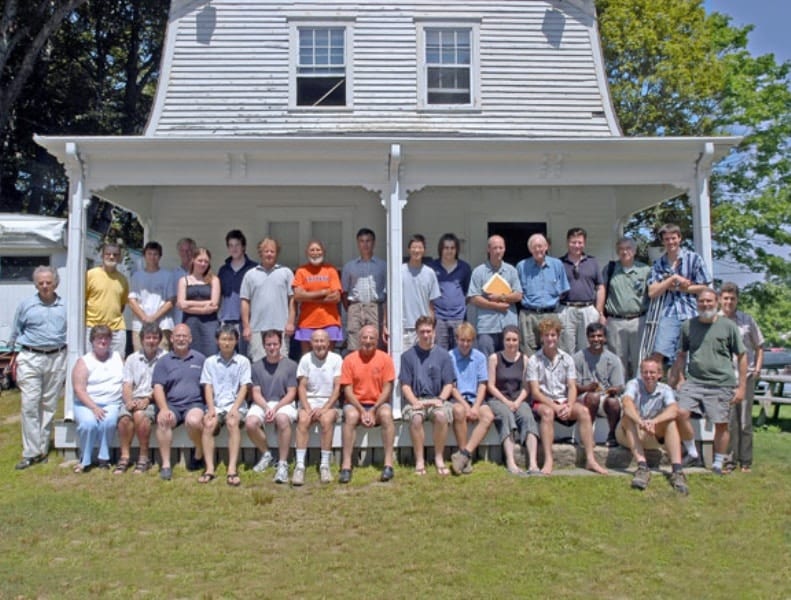
2006 Geophysical Fluid Dynamics Participants
Seated on porch (left to right): Ed Spiegel (standing); Penny Foster; Paul Dellar; Charles Doering; Takahide Okabe; Daniel Goldberg; Joe Keller; George Veronis; Devin Conroy; Dominic Vella; Rachel Zammett; Shane Keating; Sridhar Anandakrishnan; Tom Neumann; Phil Morrison (standing); Ian Eisenman (standing)
Back row: (left to right): Andrew Fowler; Neil Balmforth; Keith Moffatt; Sophie Nowicki; Robert Style; Alan Rempel; Herb Keller; Grae Worster; Victor Tsai, Andrew Wells; John Wettlaufer; Lou Howard; Dale Winebrenner; Jim Rice; Christian Schoof
News Release Image

2006 Geophysical Fluid Dynamics Participants
Seated on porch (left to right): Ed Spiegel (standing); Penny Foster; Paul Dellar; Charles Doering; Takahide Okabe; Daniel Goldberg; Joe Keller; George Veronis; Devin Conroy; Dominic Vella; Rachel Zammett; Shane Keating; Sridhar Anandakrishnan; Tom Neumann; Phil Morrison (standing); Ian Eisenman (standing)
Back row: (left to right): Andrew Fowler; Neil Balmforth; Keith Moffatt; Sophie Nowicki; Robert Style; Alan Rempel; Herb Keller; Grae Worster; Victor Tsai, Andrew Wells; John Wettlaufer; Lou Howard; Dale Winebrenner; Jim Rice; Christian Schoof
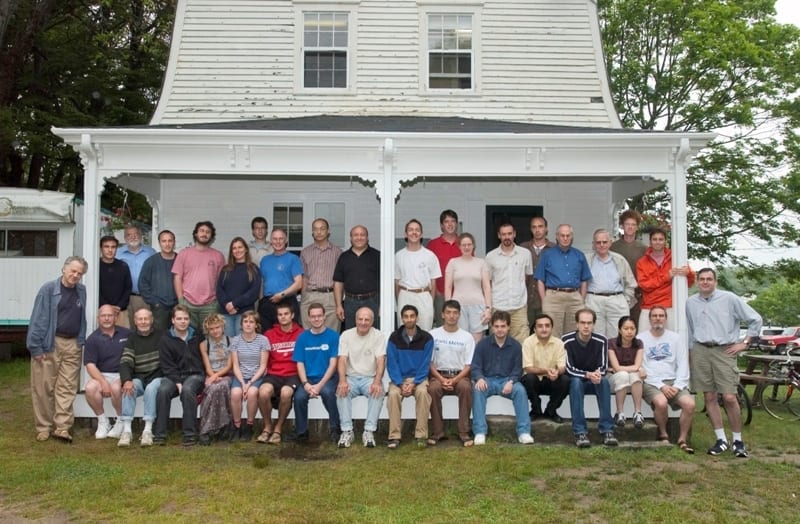
2005 Geophysical Fluid Dynamics Participants
Front row: Ed Spiegel (standing); Charlie Doering; Joe Keller; Alexander Hasha; Inga Koszalka; Tiffany Shaw; Benjamin Akers; John Rudge; George Veronis; Ravi Srinivasan; Walter Pauls; Arghir D. Zarnescu; Khachik Sargsyan; Marcus Roper; Aya Tanabe; Phil Morrison; Oliver Buhler (standing)
Back Row: Greg Chini; George Papanicolaou; Matt Finn; Manuel Berlengiero; Claudia Cenedese; Jacques Vanneste; Jack Whitehead; Yuan-nan. Young; Edriss Titi; Stefan Llewellyn-Smith; Joe LaCasce; Jennifer Siggers; Eric Vanden Eijnden; Alexandros Alexis; Norman Lebovitz; James Anderson; Onno Bokhove; Neil Balmforth
News Release Image

2005 Geophysical Fluid Dynamics Participants
Front row: Ed Spiegel (standing); Charlie Doering; Joe Keller; Alexander Hasha; Inga Koszalka; Tiffany Shaw; Benjamin Akers; John Rudge; George Veronis; Ravi Srinivasan; Walter Pauls; Arghir D. Zarnescu; Khachik Sargsyan; Marcus Roper; Aya Tanabe; Phil Morrison; Oliver Buhler (standing)
Back Row: Greg Chini; George Papanicolaou; Matt Finn; Manuel Berlengiero; Claudia Cenedese; Jacques Vanneste; Jack Whitehead; Yuan-nan. Young; Edriss Titi; Stefan Llewellyn-Smith; Joe LaCasce; Jennifer Siggers; Eric Vanden Eijnden; Alexandros Alexis; Norman Lebovitz; James Anderson; Onno Bokhove; Neil Balmforth
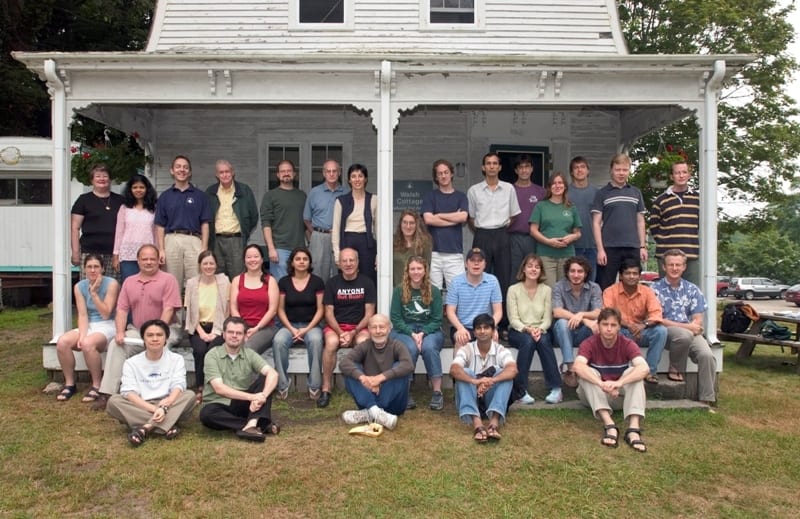
2004 Geophysical Fluid Dynamics Participants
Standing (left to right): P. Foster, S. Ghadge, S. Llwellyn-Smith, L. Howard, A. Belmonte, N. Lebovitz, P. Cessi, J. Mackinnon, M. Ward, V. Birman, A. Provenzale, C. Cenedese, G. Buck, G. Oglivie, S. Jayne Seated on porch (left to right): A. Slim, G. Egber, S. Gille, E. Williams Frajka, J. Arraut, G. Veronis, D. Wain, D. Vener, L. Neef, Y. Toledo, V. Nageswaran, W. Young Seated on ground (left to right): P. Gu, J-L. Thiffeault, J. Keller, S. Mandre, N. Balmforth
Not pictured: James Anderson, Brian Arbic, Manuel Berlengiero, Oliver Buhler, John Bush, Claudia Cenedese, Eric Chassignet, John Colosi, Colin Cotter, Richard Craster, Paul Dellar, William Deward, Gary Egbert, Alexey Federov, Raffaele Ferrari, Glenn Flierl, Jeff Forbes, Christopher Garrett, Harvey Greenspan, Pin-Gao Gu, Maura Hagan, Karl Helfrich, Myrl Hendershott, Annette Hosoi, Herbert Huppert, Richard Kerswell, Jody Klymak, Eric Kunze, Sonya Legg, Zhi Li, Xinfeng Liang, John Lowengrub, Leo Maas, Jennifer Mackinnon, Amala Mahadevan, Lakshminarayanan Mahadevan, Willem Malkus, Shreyas Mandre, John Marshall, Philip Morrision, Thomas Mullin, Walter Munk, Jonas Nycander, Richard Pawlowicz, Thomas Peacock, Robert Pinkel, Francis Poulin, Luc Rainville, Alan Rempel, Claes Rooth, Alison Rust, Richard Salmon, Alexander Soloviev, Tilman Spohn, Melvin Stern, Roman Stocker, Howard Stone, Bruce Sutherland, Eli Tziperman, Matthew Wells, John Wettlaufer, Jack Whitehead, Kraig Winters, Carl Wunsch, Jean-Paul Zahn
News Release Image

2004 Geophysical Fluid Dynamics Participants
Standing (left to right): P. Foster, S. Ghadge, S. Llwellyn-Smith, L. Howard, A. Belmonte, N. Lebovitz, P. Cessi, J. Mackinnon, M. Ward, V. Birman, A. Provenzale, C. Cenedese, G. Buck, G. Oglivie, S. Jayne Seated on porch (left to right): A. Slim, G. Egber, S. Gille, E. Williams Frajka, J. Arraut, G. Veronis, D. Wain, D. Vener, L. Neef, Y. Toledo, V. Nageswaran, W. Young Seated on ground (left to right): P. Gu, J-L. Thiffeault, J. Keller, S. Mandre, N. Balmforth
Not pictured: James Anderson, Brian Arbic, Manuel Berlengiero, Oliver Buhler, John Bush, Claudia Cenedese, Eric Chassignet, John Colosi, Colin Cotter, Richard Craster, Paul Dellar, William Deward, Gary Egbert, Alexey Federov, Raffaele Ferrari, Glenn Flierl, Jeff Forbes, Christopher Garrett, Harvey Greenspan, Pin-Gao Gu, Maura Hagan, Karl Helfrich, Myrl Hendershott, Annette Hosoi, Herbert Huppert, Richard Kerswell, Jody Klymak, Eric Kunze, Sonya Legg, Zhi Li, Xinfeng Liang, John Lowengrub, Leo Maas, Jennifer Mackinnon, Amala Mahadevan, Lakshminarayanan Mahadevan, Willem Malkus, Shreyas Mandre, John Marshall, Philip Morrision, Thomas Mullin, Walter Munk, Jonas Nycander, Richard Pawlowicz, Thomas Peacock, Robert Pinkel, Francis Poulin, Luc Rainville, Alan Rempel, Claes Rooth, Alison Rust, Richard Salmon, Alexander Soloviev, Tilman Spohn, Melvin Stern, Roman Stocker, Howard Stone, Bruce Sutherland, Eli Tziperman, Matthew Wells, John Wettlaufer, Jack Whitehead, Kraig Winters, Carl Wunsch, Jean-Paul Zahn
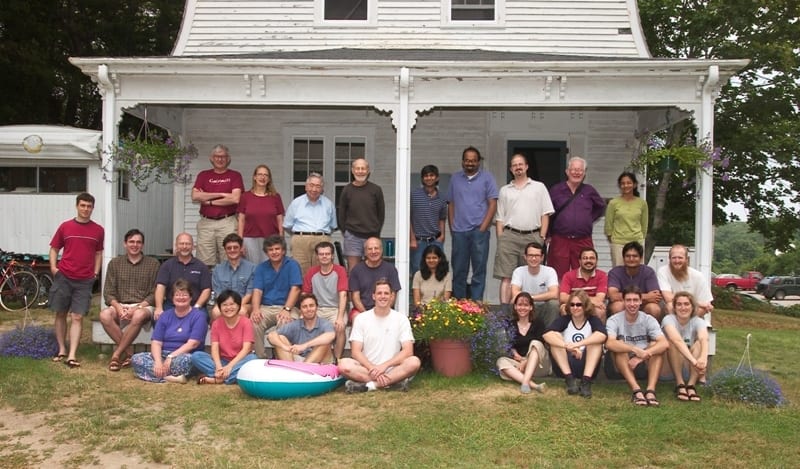
2003 Geophysical Fluid Dynamics Participants
Standing (left to right): Stephen Childress, Alison Rust, Lou Ting, Joseph Keller, Shreyas Mandre, Lakshminarayanan Mahadevan, Andrew Belmonte, Claes Rooth, Amala Mahadevan
Seated on porch (left to right): Evstati Evstatiev (standing), Oliver Buhler, Charles Doering, Misha Chertkov, Alexander Soloviev, Jean-Luc Thiffeault, George Veronis, Shilpa Ghadge, Christopher Wolfe, Amit Apte, Anshuman Roy, Neil Burrell
Seated on ground (left to right): Penny Foster, JunJun Liu, Neil Balmforth, Joel Miller, Pascal Garaud, Julia Mullarney, Andrew Thompson, Jennifer Mackinnon
News Release Image

2003 Geophysical Fluid Dynamics Participants
Standing (left to right): Stephen Childress, Alison Rust, Lou Ting, Joseph Keller, Shreyas Mandre, Lakshminarayanan Mahadevan, Andrew Belmonte, Claes Rooth, Amala Mahadevan
Seated on porch (left to right): Evstati Evstatiev (standing), Oliver Buhler, Charles Doering, Misha Chertkov, Alexander Soloviev, Jean-Luc Thiffeault, George Veronis, Shilpa Ghadge, Christopher Wolfe, Amit Apte, Anshuman Roy, Neil Burrell
Seated on ground (left to right): Penny Foster, JunJun Liu, Neil Balmforth, Joel Miller, Pascal Garaud, Julia Mullarney, Andrew Thompson, Jennifer Mackinnon
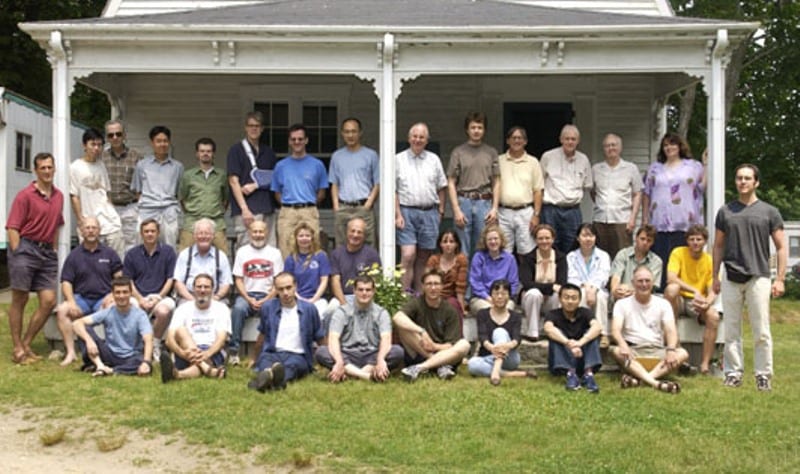
2002 Geophysical Fluid Dynamics Program Staff
Standing (left to right): Richard R. Kerswell, Zhiming Kuang, Edward A. Spiegel, Tomoki Tozuka, Jean-Luc Thiffeault, Chris Hallstrom, Colm-cille P. Caulfield, Yuan-Nan Young, Friedrich H. Busse, Vitalii Sheremet, Wayne H. Schubert, Louis N. Howard, Willem V.R. Malkus, Janet Fields, Radostin D. Simitev
Seated on porch (left to right): Charles Doering, Peter Constantin, Claes G. Rooth, Joseph B. Keller, Helen C. Andersson, George Veronis, Pascale Garaud, Jennifer H. Siggers, Ulrike Riemenschneider, Huiqun Wang, Neil J. Balmforth, Eric P. Chassignet
Seated on ground (left to right): Evstati G. Evstatiev, Philip J. Morrison, Alexandros Alexakis, Francois Petrelis, Stephen C. Plasting, Jie Yu, Lu Lu, Jack Whitehead
News Release Image

2002 Geophysical Fluid Dynamics Program Staff
Standing (left to right): Richard R. Kerswell, Zhiming Kuang, Edward A. Spiegel, Tomoki Tozuka, Jean-Luc Thiffeault, Chris Hallstrom, Colm-cille P. Caulfield, Yuan-Nan Young, Friedrich H. Busse, Vitalii Sheremet, Wayne H. Schubert, Louis N. Howard, Willem V.R. Malkus, Janet Fields, Radostin D. Simitev
Seated on porch (left to right): Charles Doering, Peter Constantin, Claes G. Rooth, Joseph B. Keller, Helen C. Andersson, George Veronis, Pascale Garaud, Jennifer H. Siggers, Ulrike Riemenschneider, Huiqun Wang, Neil J. Balmforth, Eric P. Chassignet
Seated on ground (left to right): Evstati G. Evstatiev, Philip J. Morrison, Alexandros Alexakis, Francois Petrelis, Stephen C. Plasting, Jie Yu, Lu Lu, Jack Whitehead
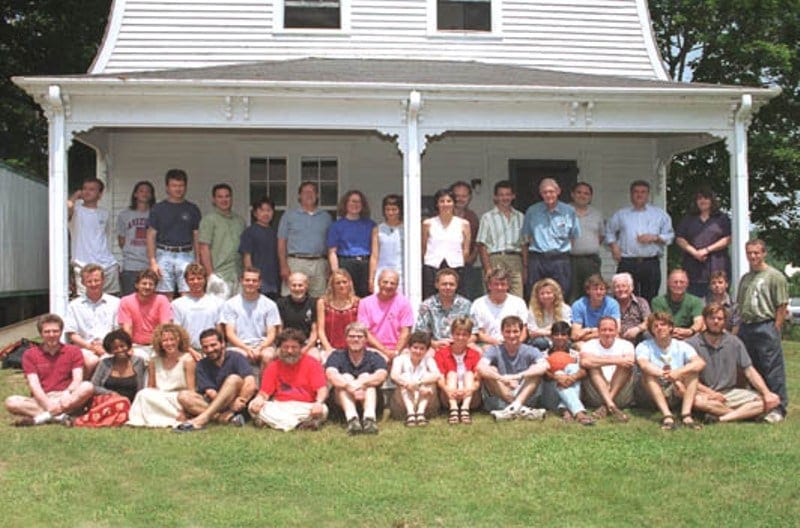
2001 Geophysical Fluid Dynamics Program Staff
Standing (left to right): Sebastien Bigorre, Dargan Frierson, Vitalii Sheremet, Philip A. Yecko, Takamitsu Ito, Wayne H. Schubert, Janet Pierrehumbert, Annalisa Bracco, Paola Cessi, Christopher N. Hill, Louis N. Howard, Jean-Michel Campin, Louis N. Howard, Vinicio Pelino, John Marshall, Janet Fields
Seated on porch (left to right): William R. Young, Francesco Paparella, Matthew S. Spydell, Giulio Boccaletti, Joseph B. Keller, Agatha DeBoer, George Veronis, Geoffrey K. Vallis, William K. Dewar, Helen C. Andersson, Eric P. Chassignet, Claes G. Rooth, Jack Whitehead, Neil J. Balmforth, Eli Tziperman
Seated on ground (left to right): Raffaele Ferrari, Abebech Dione, Chiara Toniolo, Sandro Calmanti, Raymond T. Pierrehumbert, Chris Hallstrom, Fiona J.R. Eccles, Lianke A. Te Raa, Edwin P. Gerber, Shreyas D. Mandre, Thierry Huck, Alexander Stein, Peter Huybers
News Release Image

2001 Geophysical Fluid Dynamics Program Staff
Standing (left to right): Sebastien Bigorre, Dargan Frierson, Vitalii Sheremet, Philip A. Yecko, Takamitsu Ito, Wayne H. Schubert, Janet Pierrehumbert, Annalisa Bracco, Paola Cessi, Christopher N. Hill, Louis N. Howard, Jean-Michel Campin, Louis N. Howard, Vinicio Pelino, John Marshall, Janet Fields
Seated on porch (left to right): William R. Young, Francesco Paparella, Matthew S. Spydell, Giulio Boccaletti, Joseph B. Keller, Agatha DeBoer, George Veronis, Geoffrey K. Vallis, William K. Dewar, Helen C. Andersson, Eric P. Chassignet, Claes G. Rooth, Jack Whitehead, Neil J. Balmforth, Eli Tziperman
Seated on ground (left to right): Raffaele Ferrari, Abebech Dione, Chiara Toniolo, Sandro Calmanti, Raymond T. Pierrehumbert, Chris Hallstrom, Fiona J.R. Eccles, Lianke A. Te Raa, Edwin P. Gerber, Shreyas D. Mandre, Thierry Huck, Alexander Stein, Peter Huybers
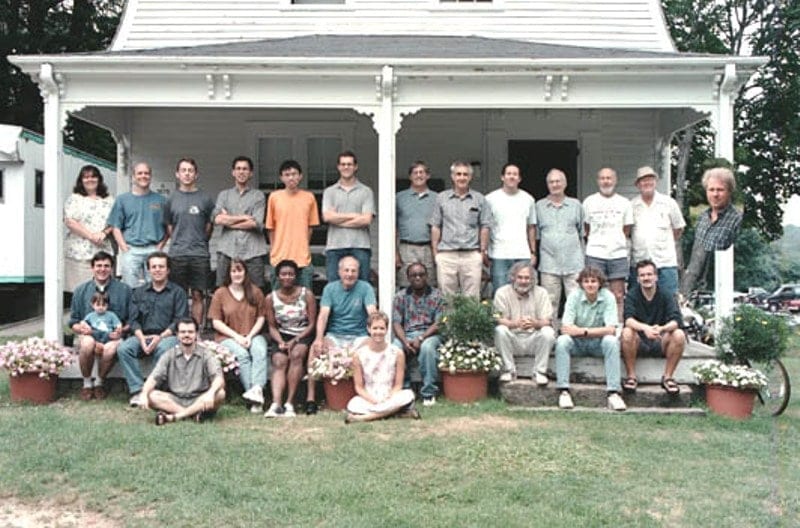
2000 Geophysical Fluid Dynamics Program Staff
Standing (left to right): Janet Fields, Jeffrey M. Moehlis, Stefan G. Llewellyn Smith, Christopher C. Walker, Zhiming Kuang, Giulio Boccaletti, Wayne H. Schubert, Richard L. Salmon, Tivon E. Jacobson, Willem Malkus, Joseph B. Keller, Claes G. Rooth, Raymond Alan Plumb
Seated on porch (left to right): Oliver & John Buhler, Christos M. Mitas, Karen M. Shell, Lucy J. Campbell, George Veronis, Christian Sonekan, Isaac Held, Eric P. Chassignet, Jeffery L. Hollingsworth
Seated on ground (left to right): Jean-Luc Thiffeault, Cheryl L. Lacotta
News Release Image

2000 Geophysical Fluid Dynamics Program Staff
Standing (left to right): Janet Fields, Jeffrey M. Moehlis, Stefan G. Llewellyn Smith, Christopher C. Walker, Zhiming Kuang, Giulio Boccaletti, Wayne H. Schubert, Richard L. Salmon, Tivon E. Jacobson, Willem Malkus, Joseph B. Keller, Claes G. Rooth, Raymond Alan Plumb
Seated on porch (left to right): Oliver & John Buhler, Christos M. Mitas, Karen M. Shell, Lucy J. Campbell, George Veronis, Christian Sonekan, Isaac Held, Eric P. Chassignet, Jeffery L. Hollingsworth
Seated on ground (left to right): Jean-Luc Thiffeault, Cheryl L. Lacotta
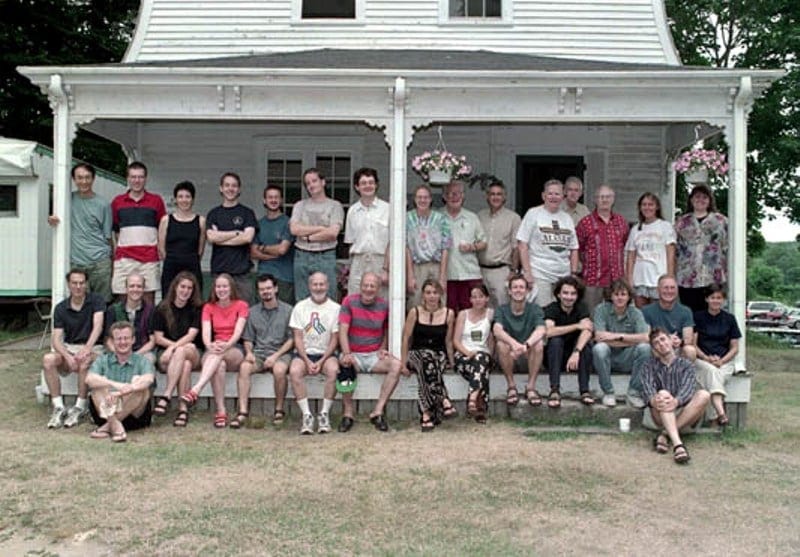
1999 Geophysical Fluid Dynamics Program Staff
Standing (left to right): Yuan-Nan Young, Raffaele Ferrari, Paola Cessi, Stefan Llewellyn Smith, Francesco Paparella, Jost-Diedrich Graf von Hardenberg, Rupert Ford, Meredith Metzger, Claes Rooth, Rick Salmon, James Anderson, Louis Howard, Willem Malkus, Claudia Cenedese, Janet Fields
Seated on porch (left to right): James Ledwell, Jeffrey Moehlis, Jennifer MacKinnon, Jennifer Curtis, Jean-Luc Thiffeault, Joe Keller, George Veronis, Claudia Pasquero, Pascale Garaud, David Osmond, Roberto Sassi, Eric Chassignet, Jack Whitehead, Sonya Legg
Seated on ground (left to right): William Young, Neil Balmforth
News Release Image

1999 Geophysical Fluid Dynamics Program Staff
Standing (left to right): Yuan-Nan Young, Raffaele Ferrari, Paola Cessi, Stefan Llewellyn Smith, Francesco Paparella, Jost-Diedrich Graf von Hardenberg, Rupert Ford, Meredith Metzger, Claes Rooth, Rick Salmon, James Anderson, Louis Howard, Willem Malkus, Claudia Cenedese, Janet Fields
Seated on porch (left to right): James Ledwell, Jeffrey Moehlis, Jennifer MacKinnon, Jennifer Curtis, Jean-Luc Thiffeault, Joe Keller, George Veronis, Claudia Pasquero, Pascale Garaud, David Osmond, Roberto Sassi, Eric Chassignet, Jack Whitehead, Sonya Legg
Seated on ground (left to right): William Young, Neil Balmforth
News Release Image
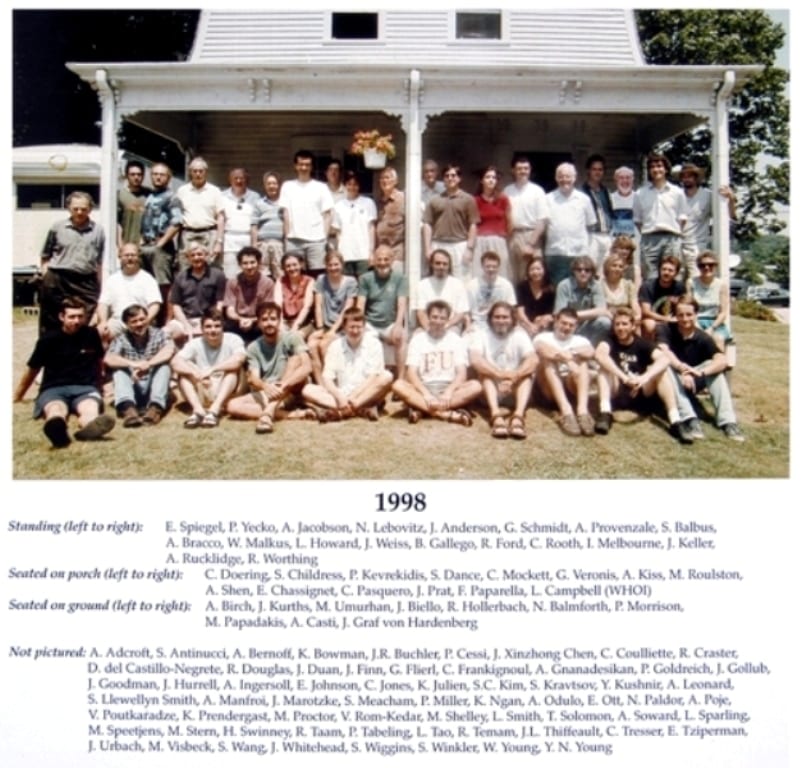
1998 Geophysical Fluid Dynamics Program Staff
News Release Image
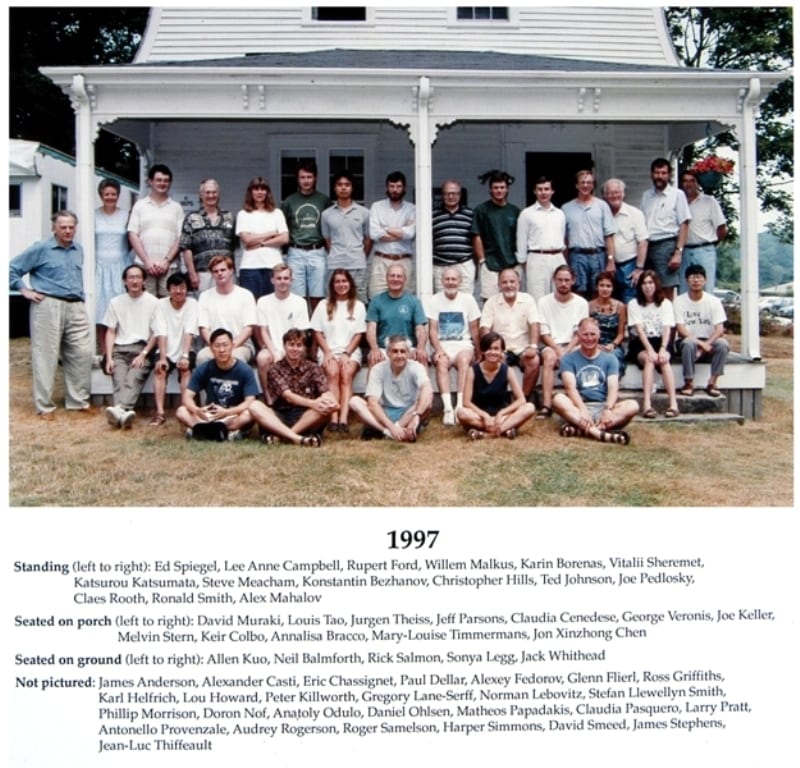
1997 Geophysical Fluid Dynamics Program Staff
News Release Image
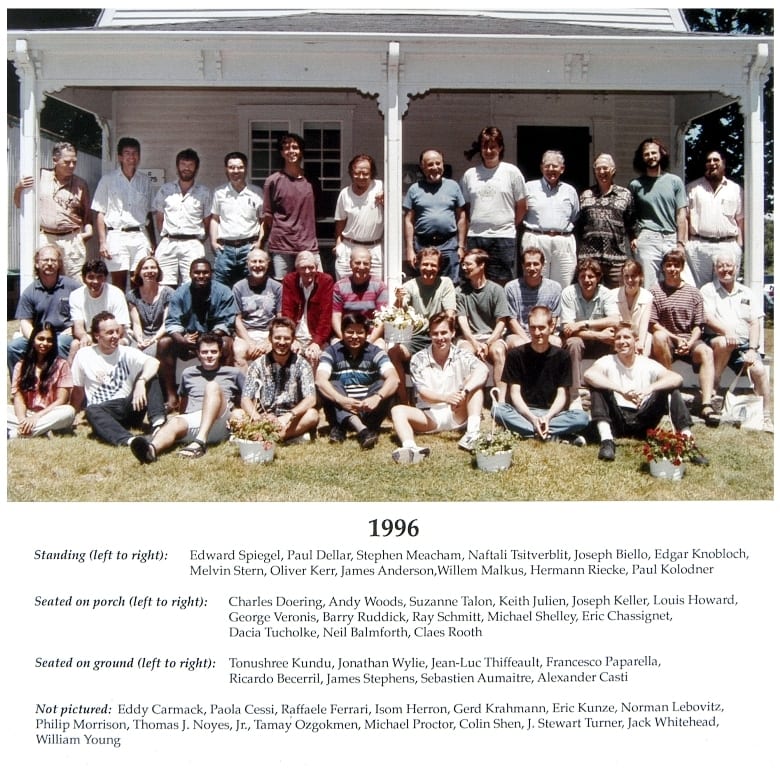
1996 Geophysical Fluid Dynamics Program Staff
News Release Image
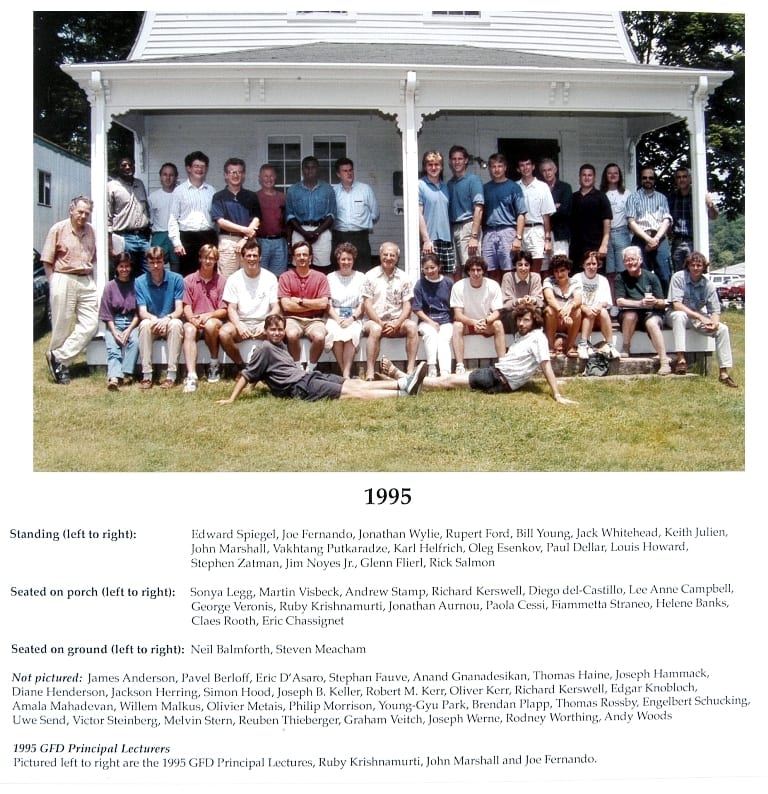
1995 Geophysical Fluid Dynamics Program Staff
News Release Image
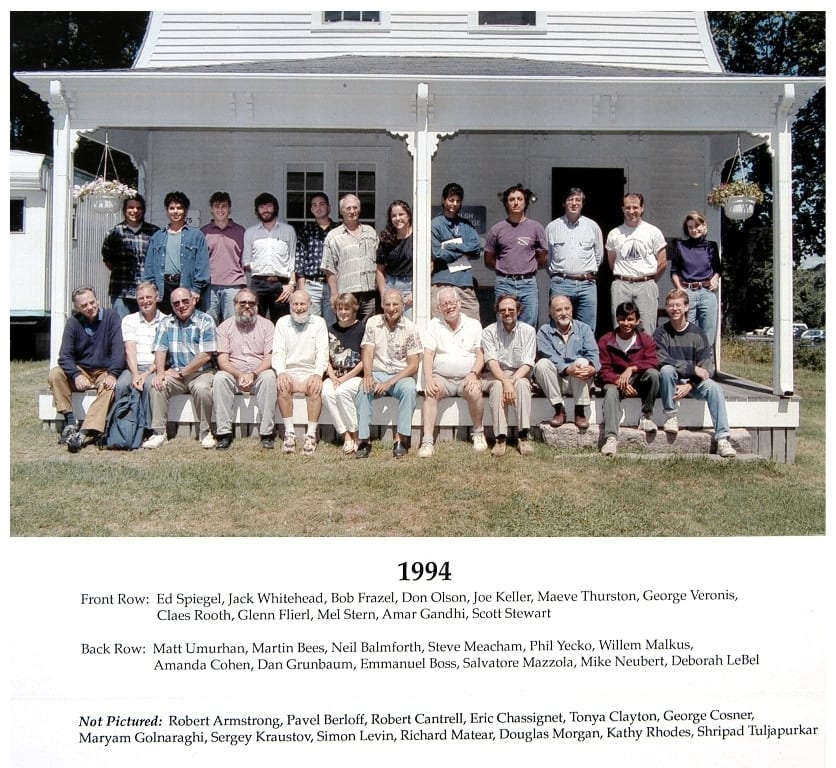
1994 Geophysical Fluid Dynamics Program Staff
News Release Image
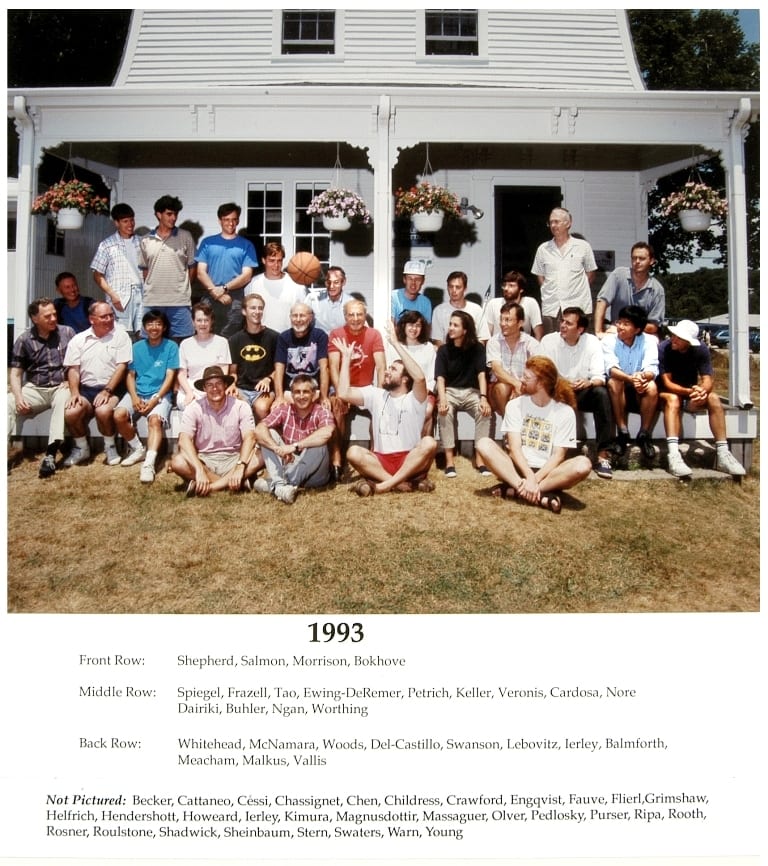
1993 Geophysical Fluid Dynamics Program Staff
News Release Image
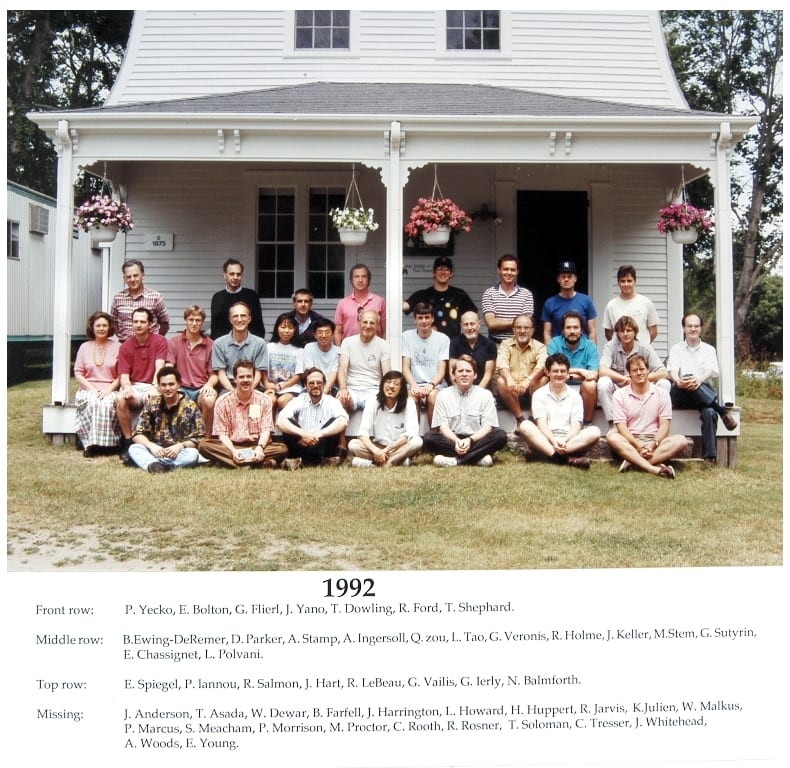
1992 Geophysical Fluid Dynamics Program Staff
News Release Image
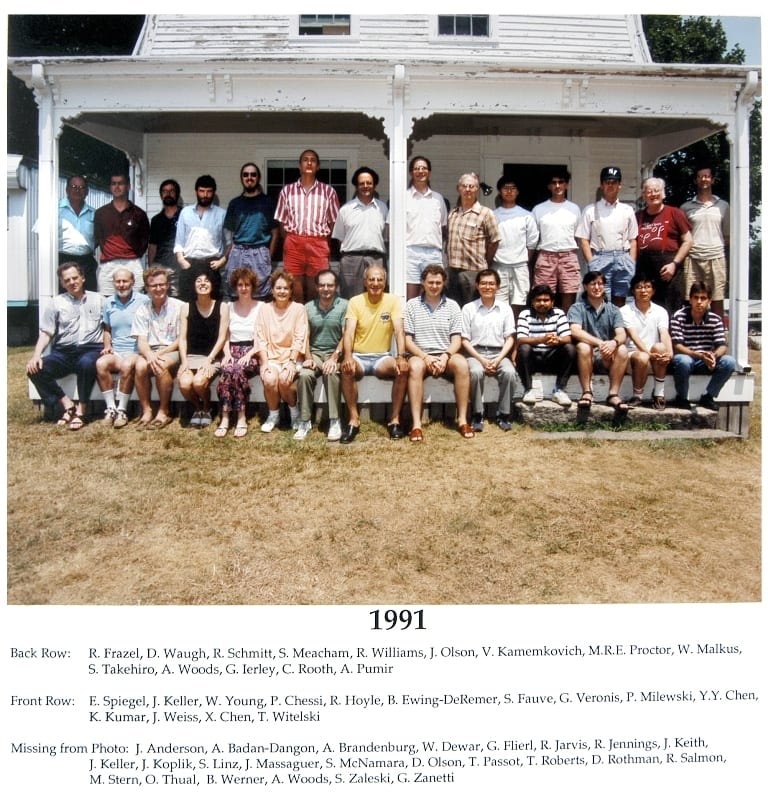
1991 Geophysical Fluid Dynamics Program Staff
News Release Image
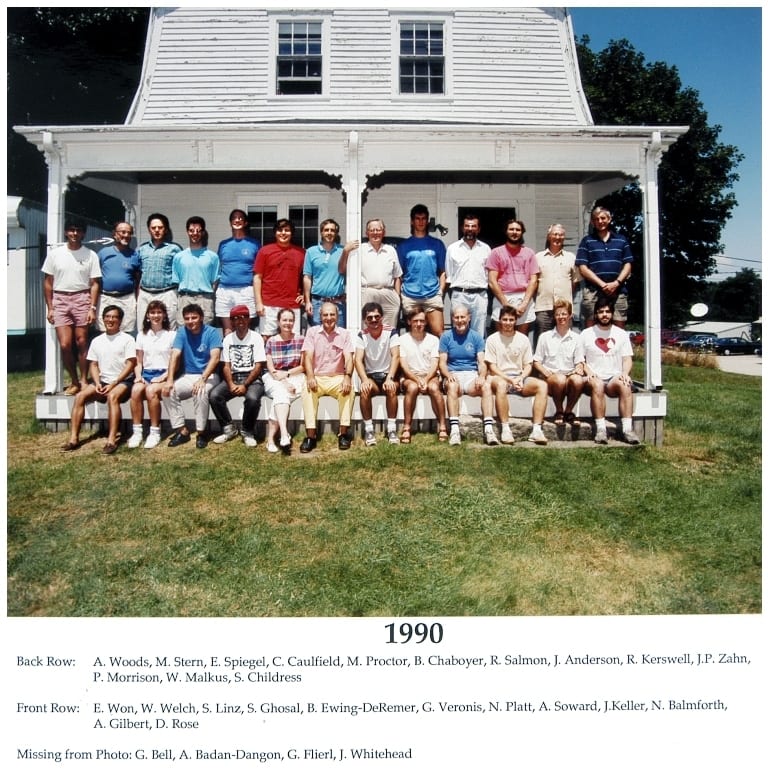
1990 Geophysical Fluid Dynamics Program Staff
News Release Image
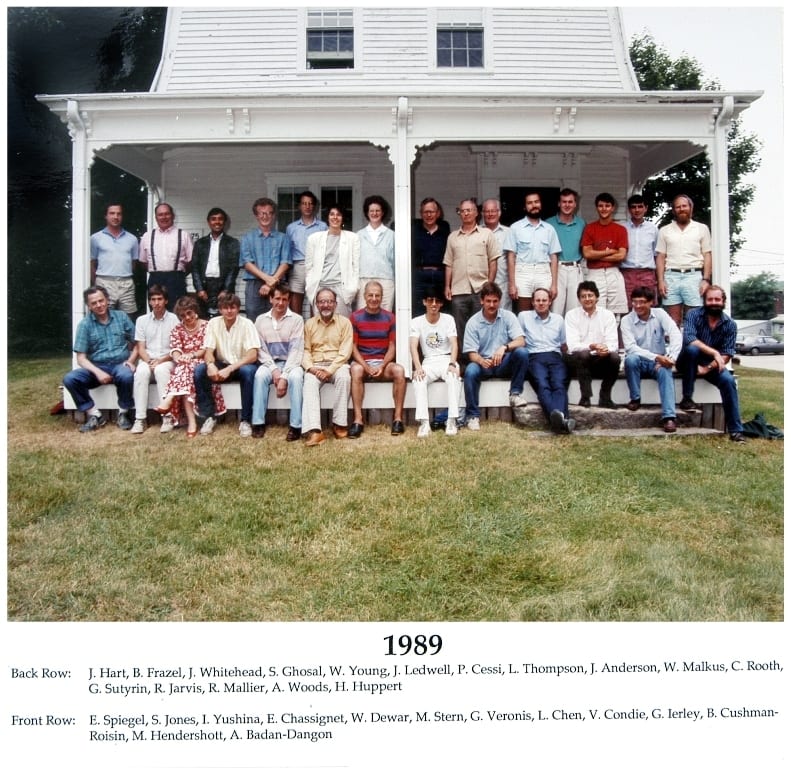
1989 Geophysical Fluid Dynamics Program Staff
News Release Image
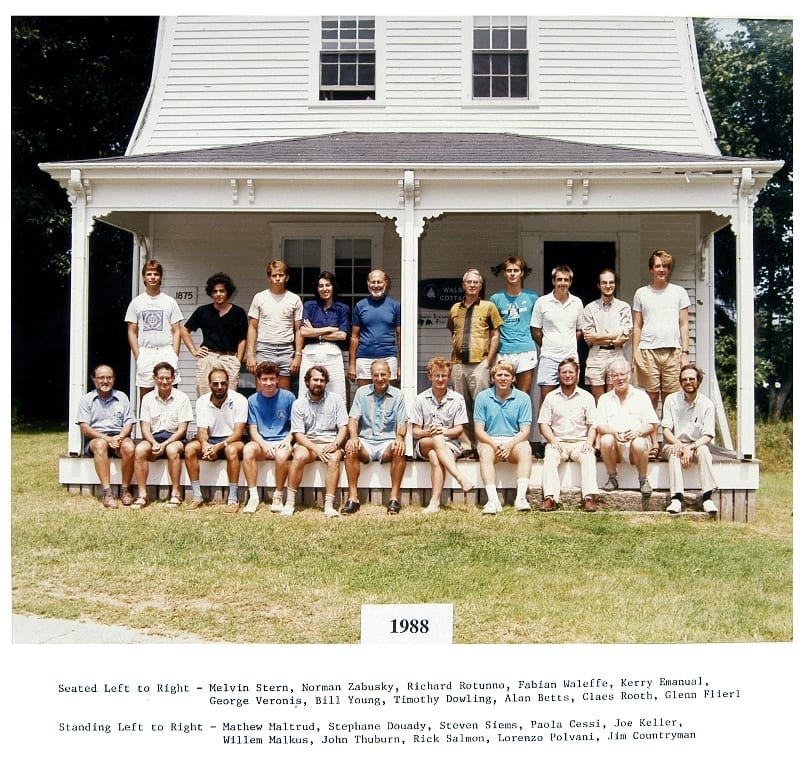
1988 Geophysical Fluid Dynamics Program Staff
News Release Image
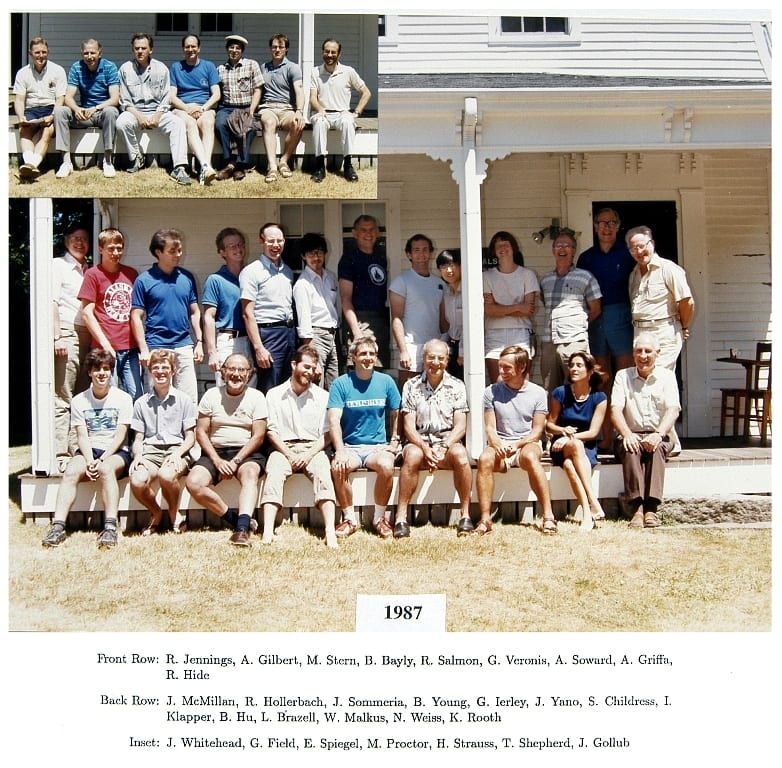
1987 Geophysical Fluid Dynamics Program Staff
News Release Image
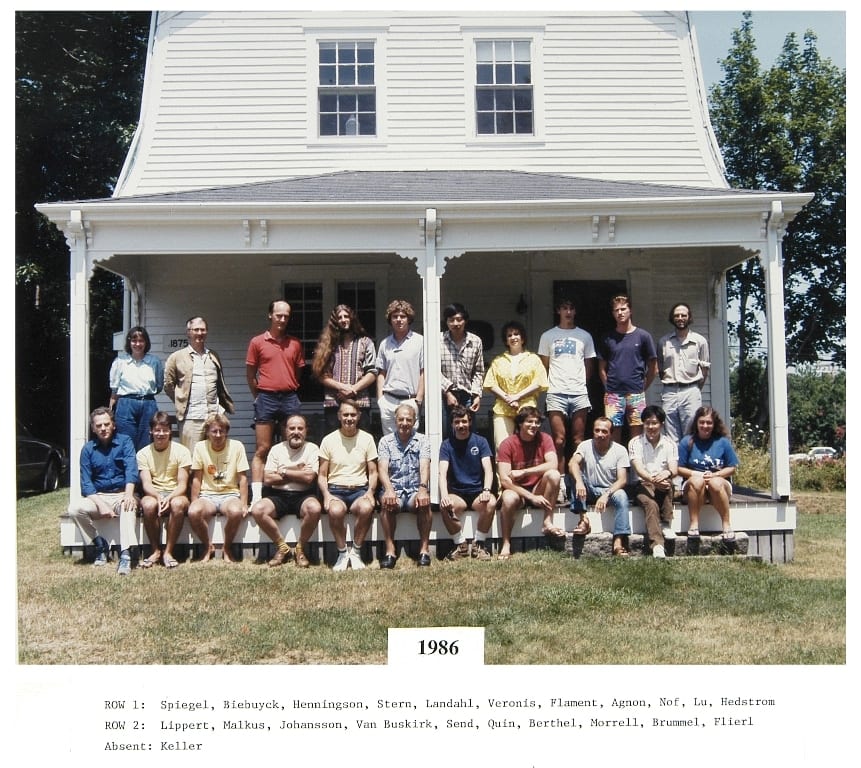
1986 Geophysical Fluid Dynamics Program Staff
News Release Image
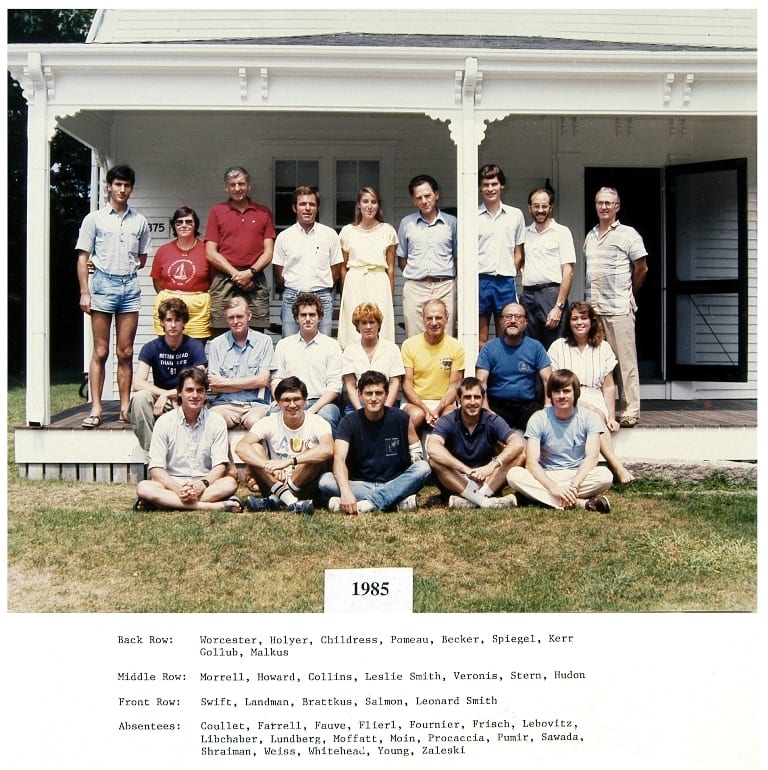
1985 Geophysical Fluid Dynamics Program Staff
News Release Image
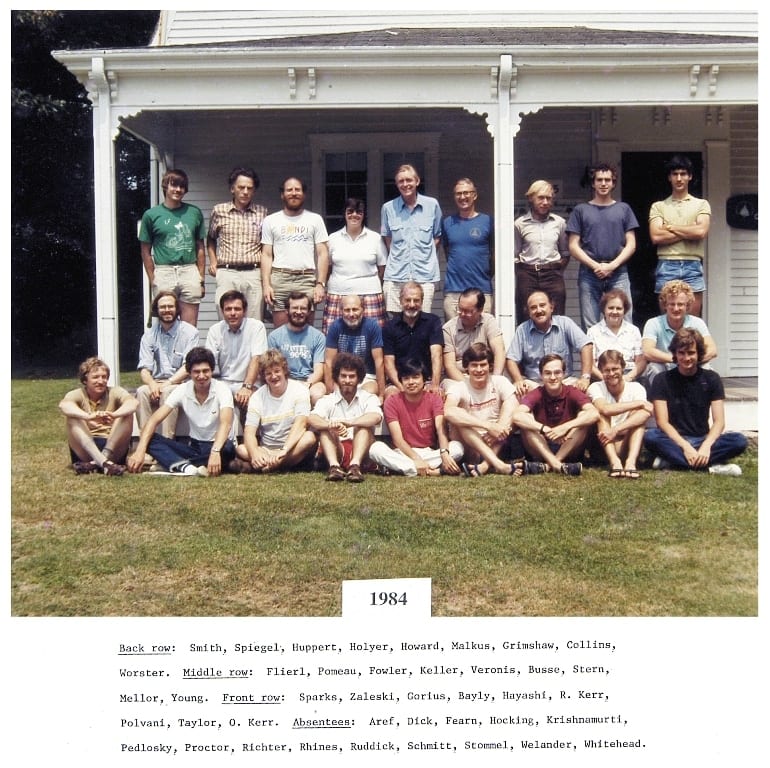
1984 Geophysical Fluid Dynamics Program Staff
News Release Image
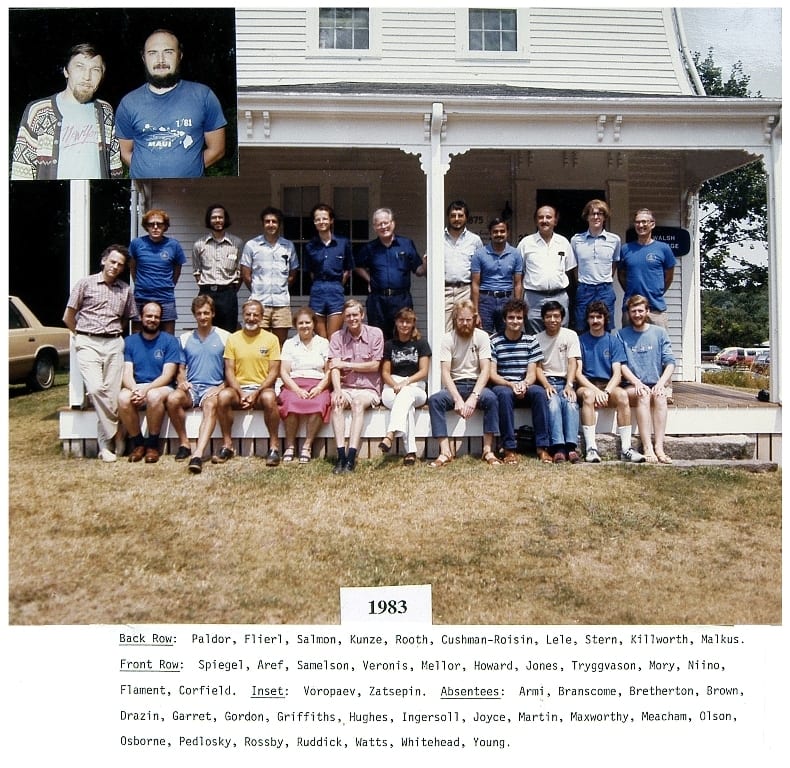
1983 Geophysical Fluid Dynamics Program Staff
News Release Image
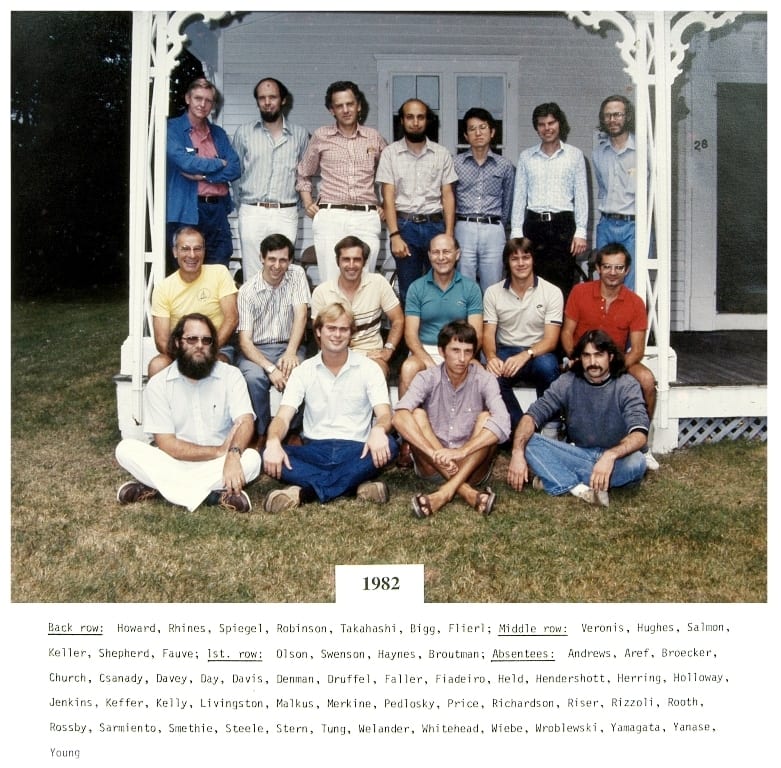
1982 Geophysical Fluid Dynamics Program Staff
News Release Image
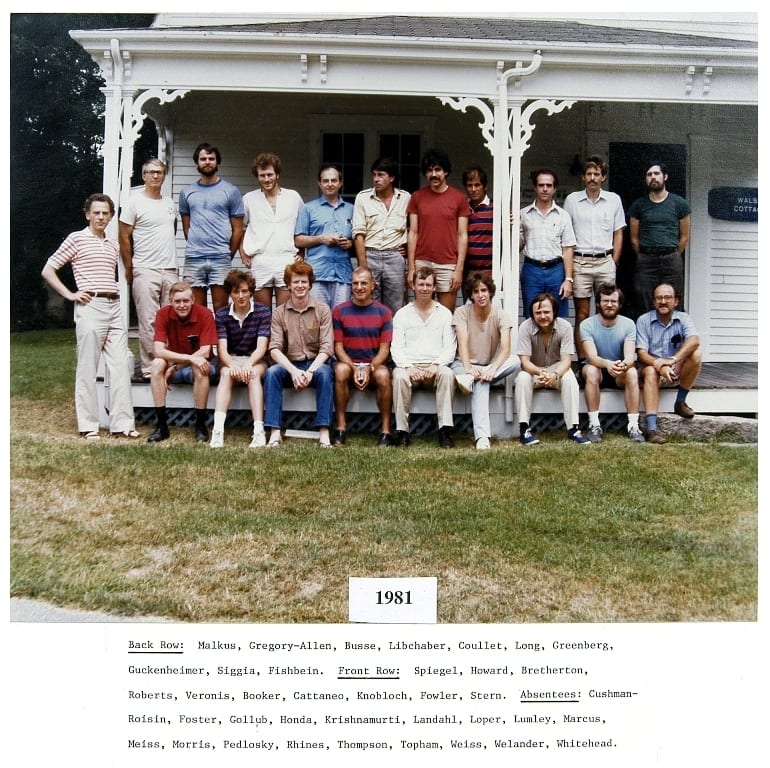
1981 Geophysical Fluid Dynamics Program Staff
News Release Image
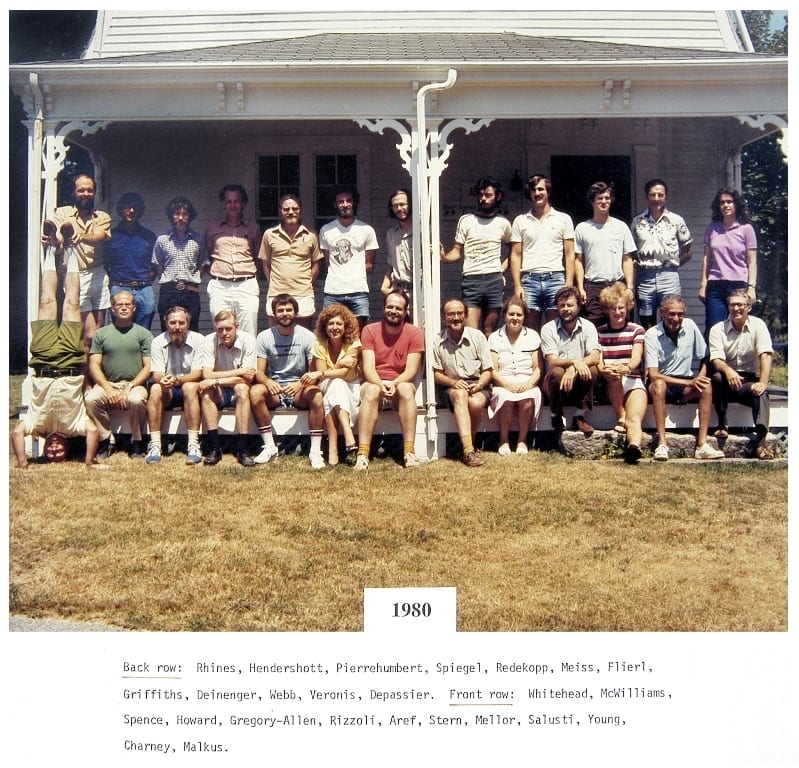
1980 Geophysical Fluid Dynamics Program Staff
News Release Image
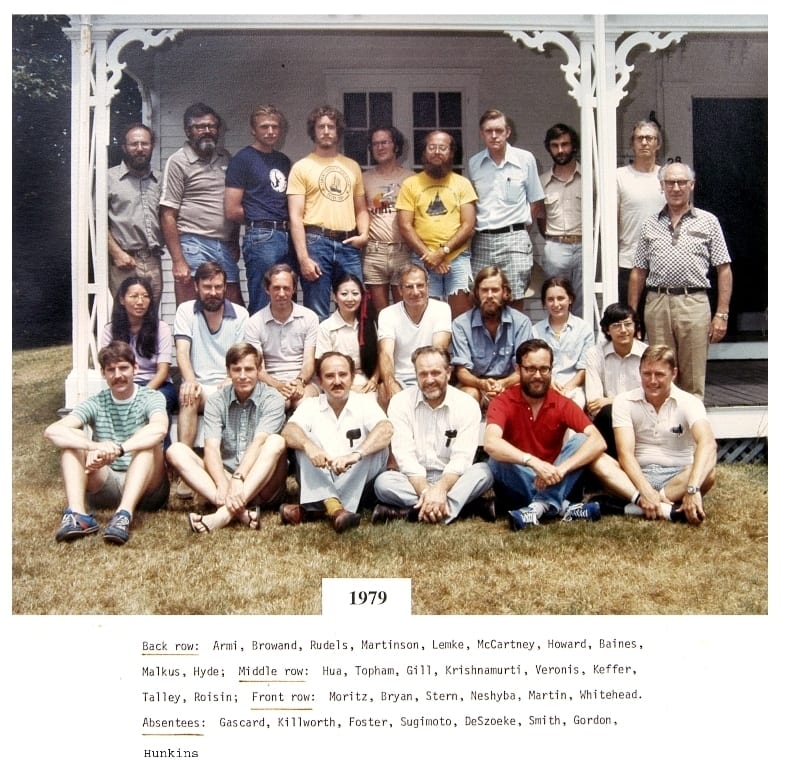
1979 Geophysical Fluid Dynamics Program Staff
News Release Image
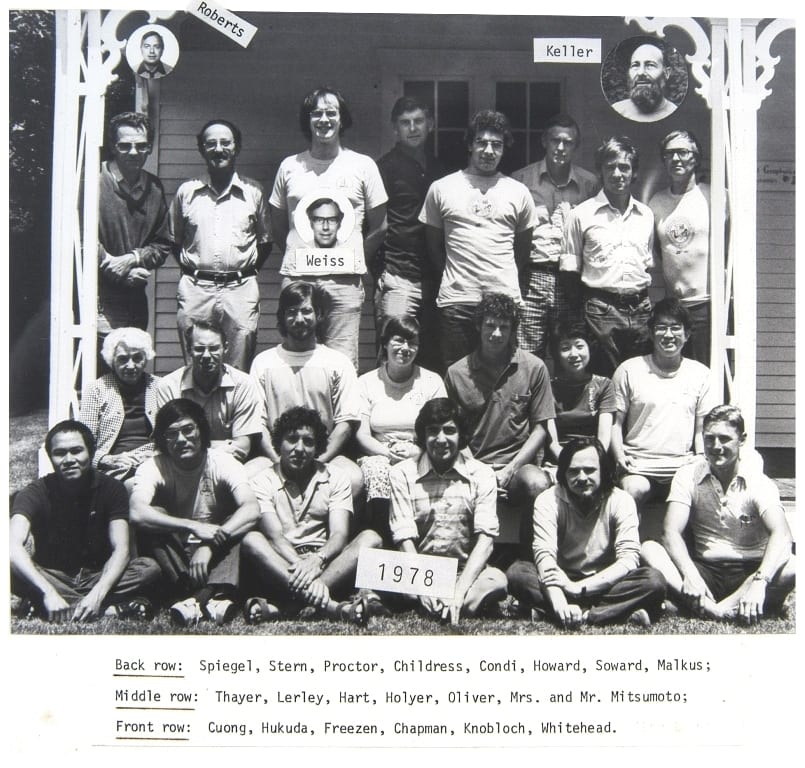
1978 Geophysical Fluid Dynamics Program Staff
News Release Image
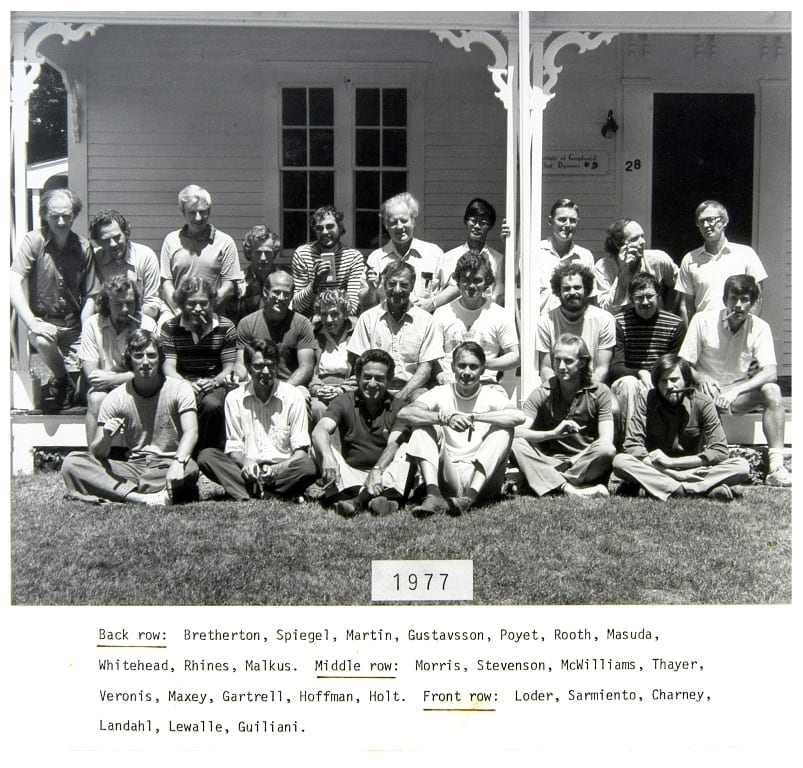
1977 Geophysical Fluid Dynamics Program Staff
News Release Image
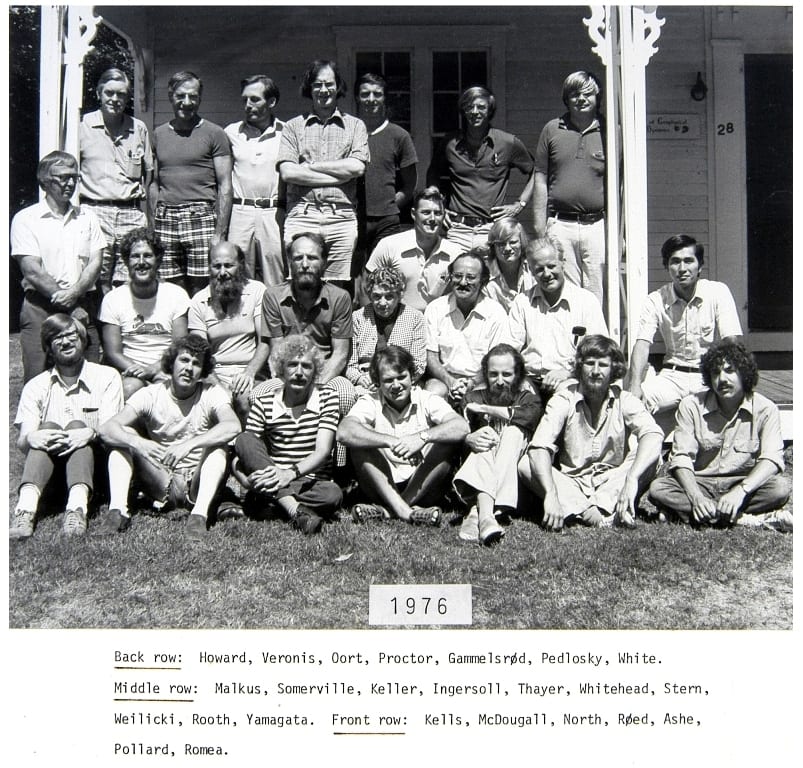
1976 Geophysical Fluid Dynamics Program Staff
News Release Image
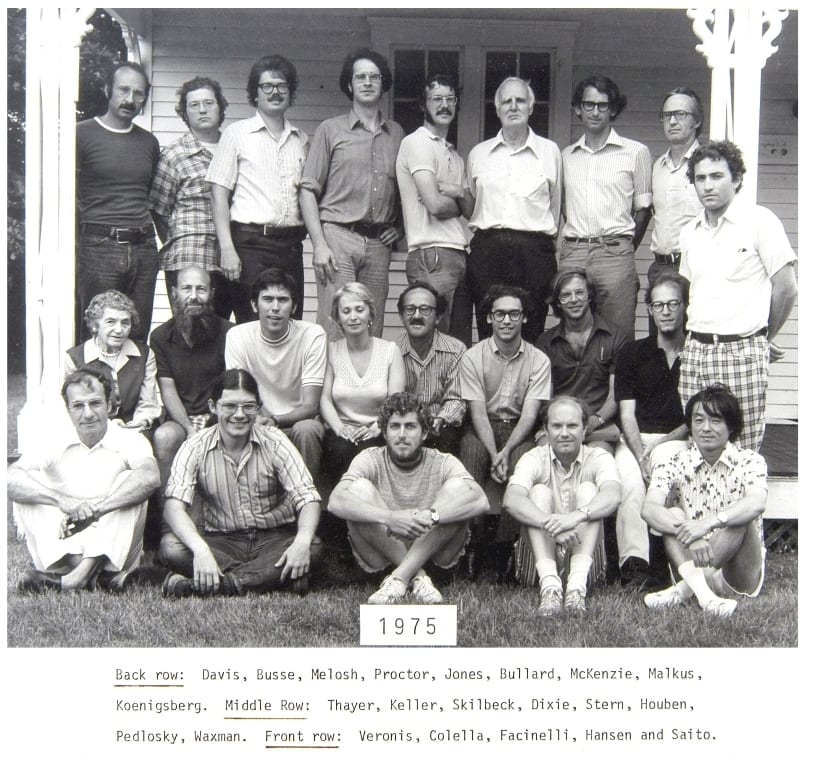
1975 Geophysical Fluid Dynamics Program Staff
News Release Image
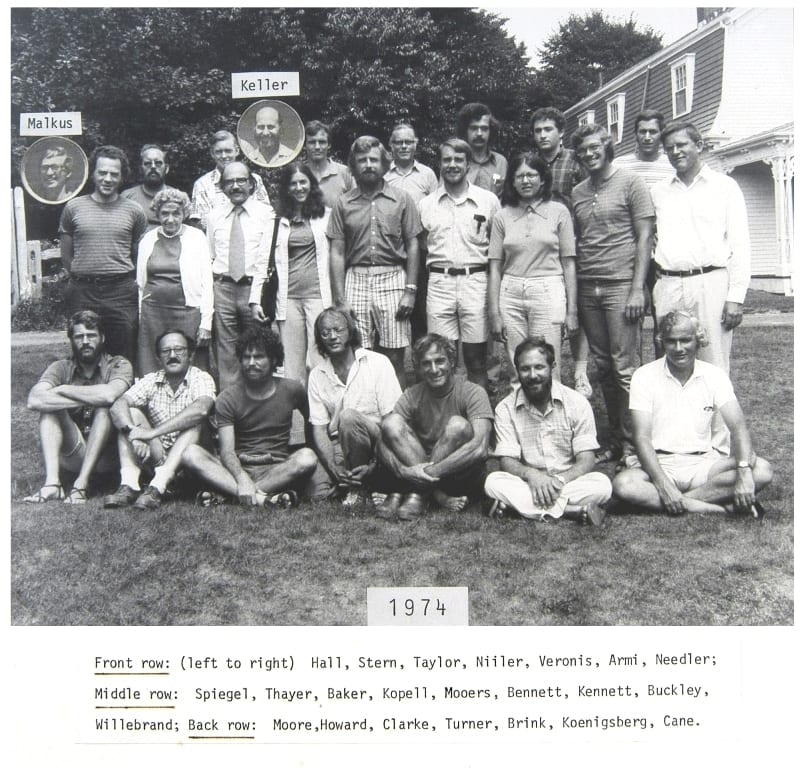
1974 Geophysical Fluid Dynamics Program Staff
News Release Image
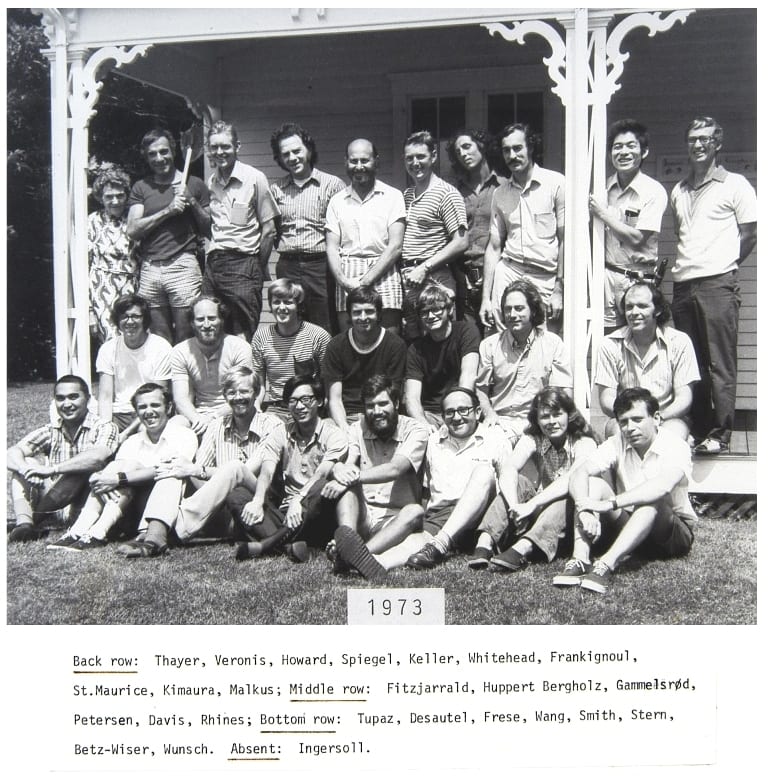
1973 Geophysical Fluid Dynamics Program Staff
News Release Image
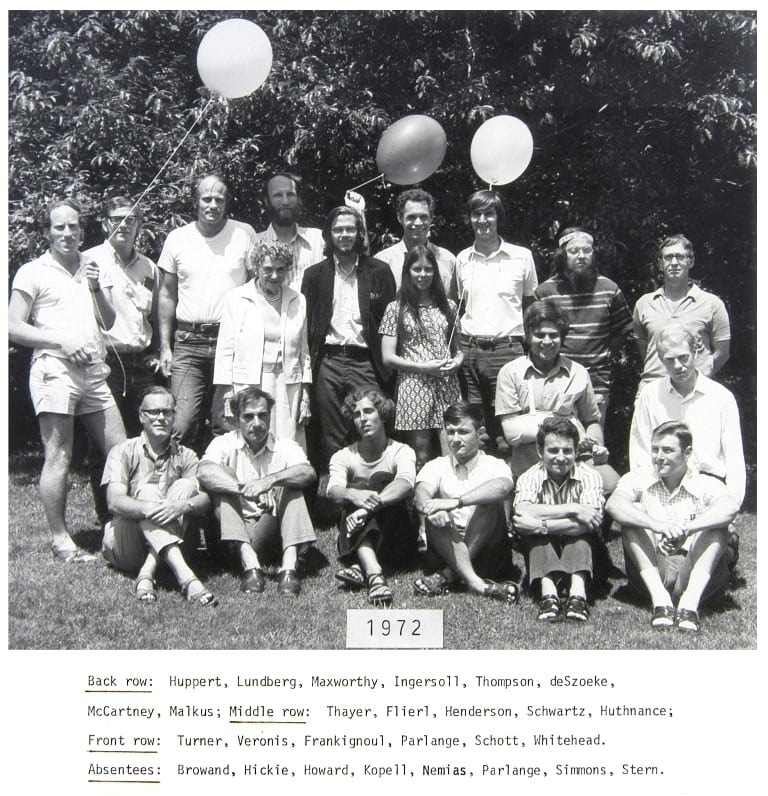
1972 Geophysical Fluid Dynamics Program Staff
News Release Image
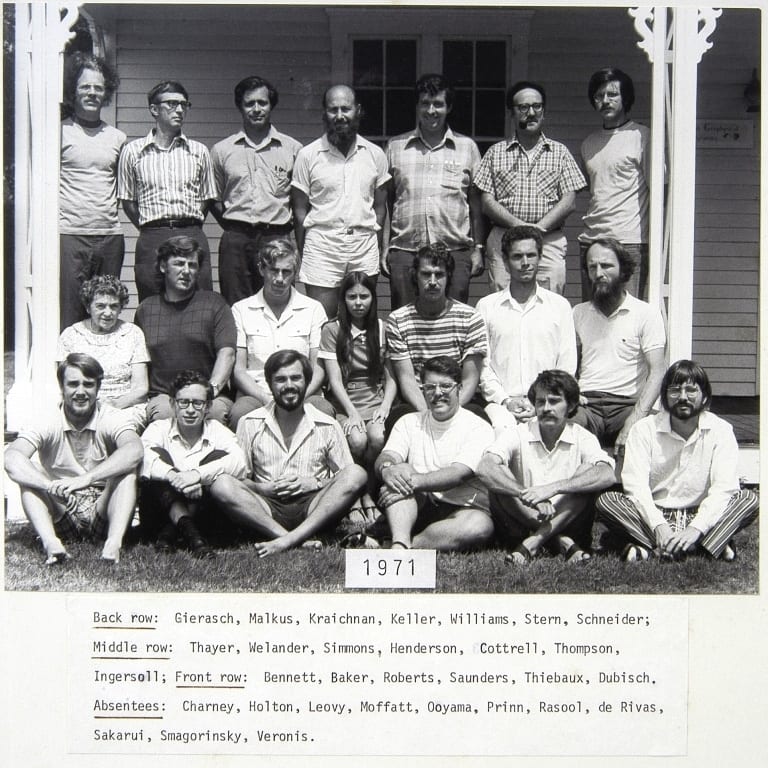
1971 Geophysical Fluid Dynamics Program Staff
News Release Image
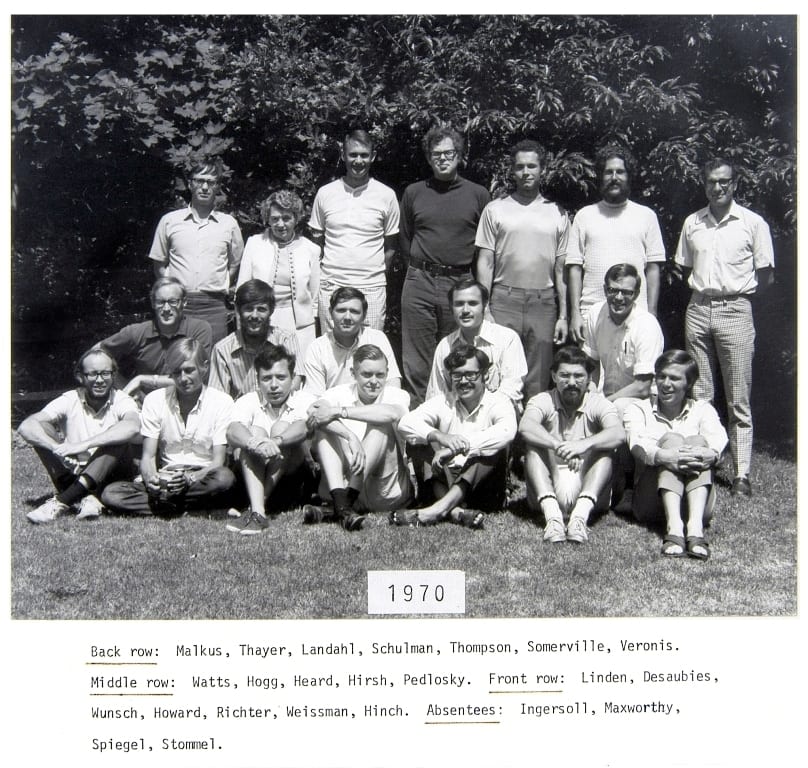
1970 Geophysical Fluid Dynamics Program Staff
News Release Image
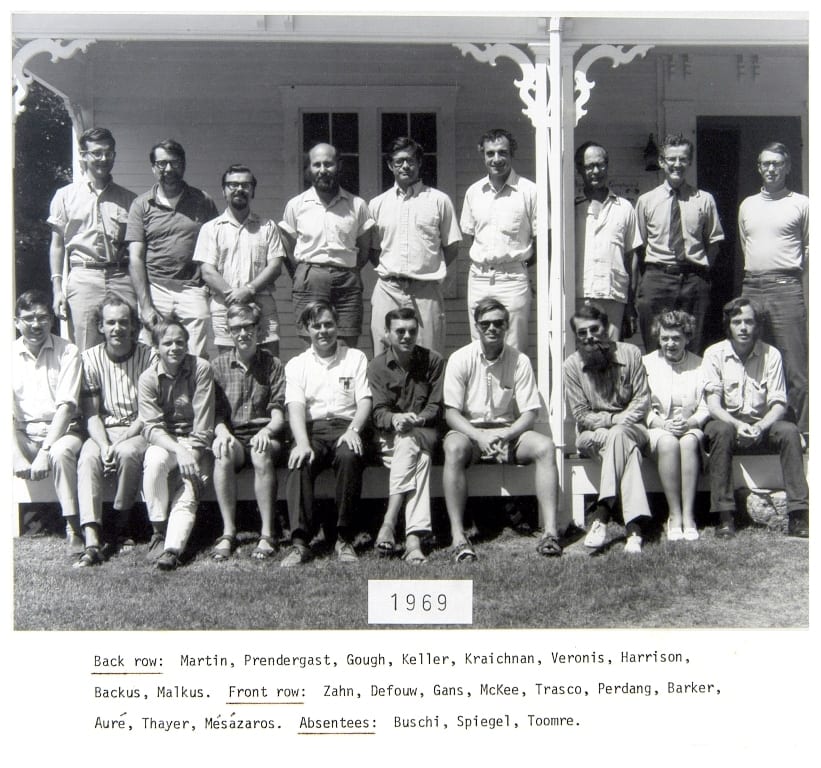
1969 Geophysical Fluid Dynamics Program Staff
News Release Image
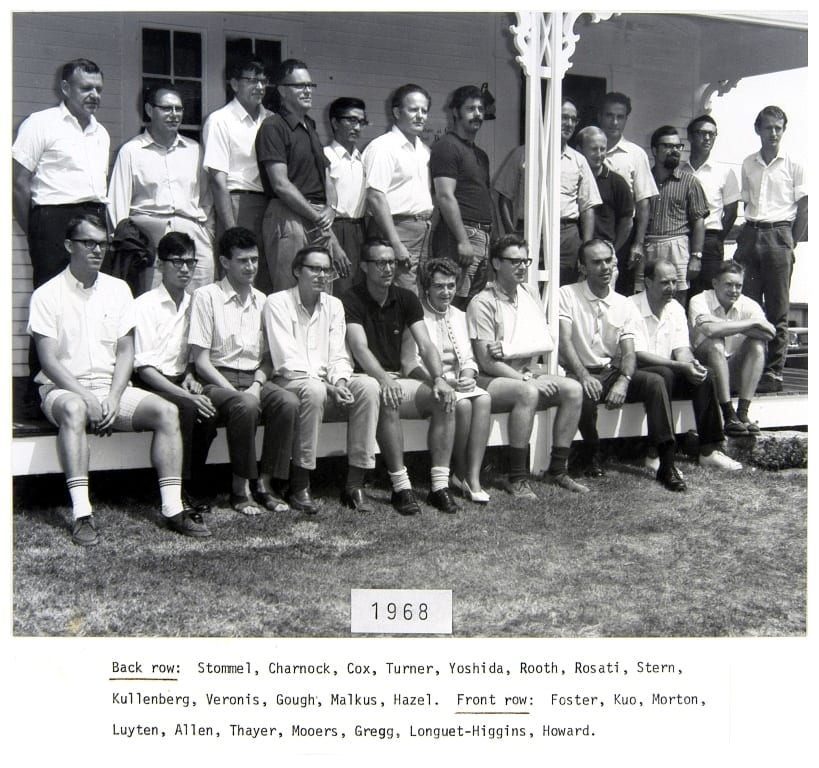
1968 Geophysical Fluid Dynamics Program Staff
News Release Image
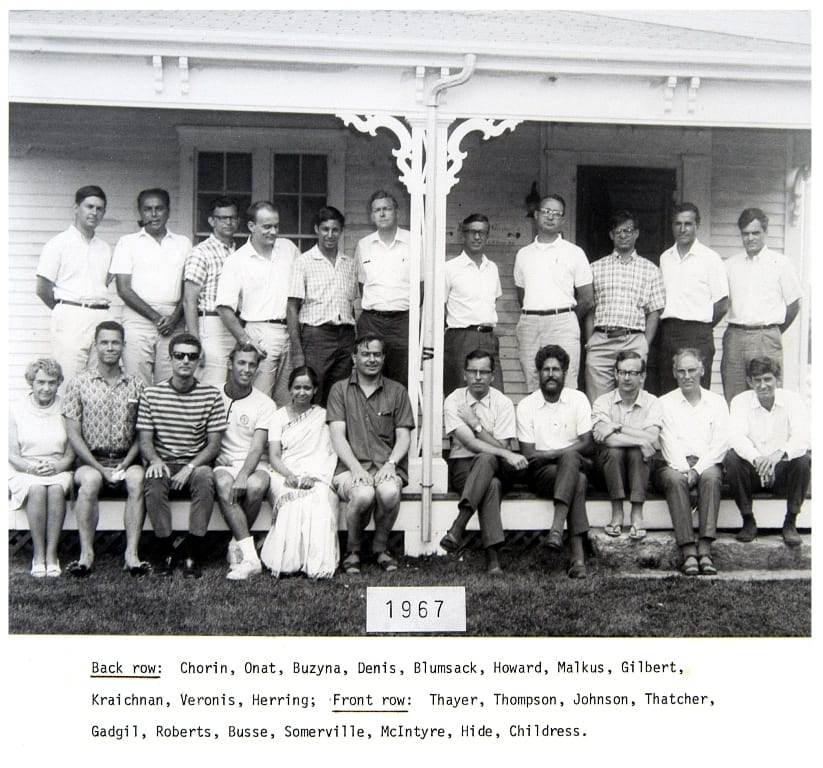
1967 Geophysical Fluid Dynamics Program Staff
News Release Image
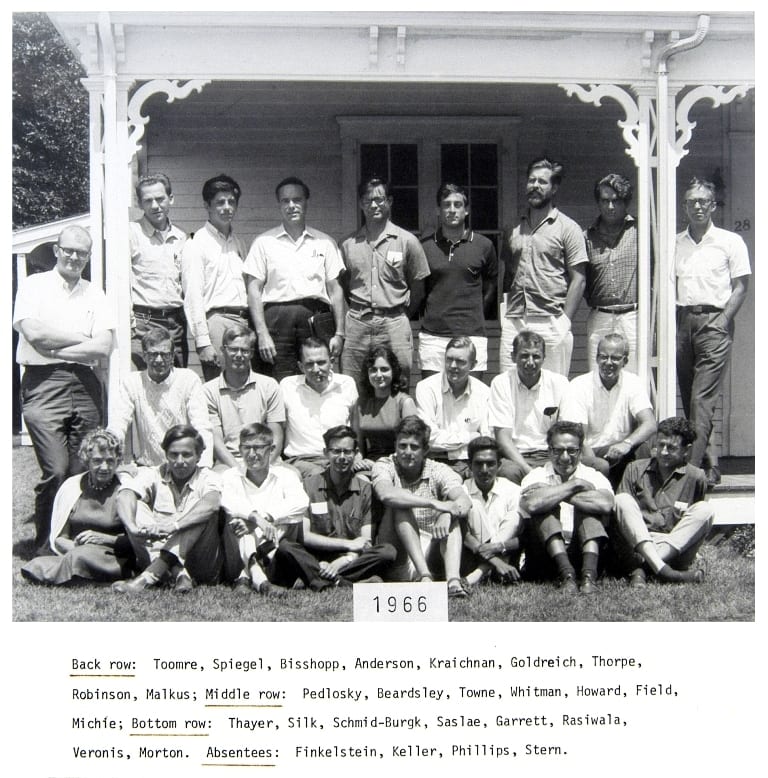
1966 Geophysical Fluid Dynamics Program Staff
News Release Image
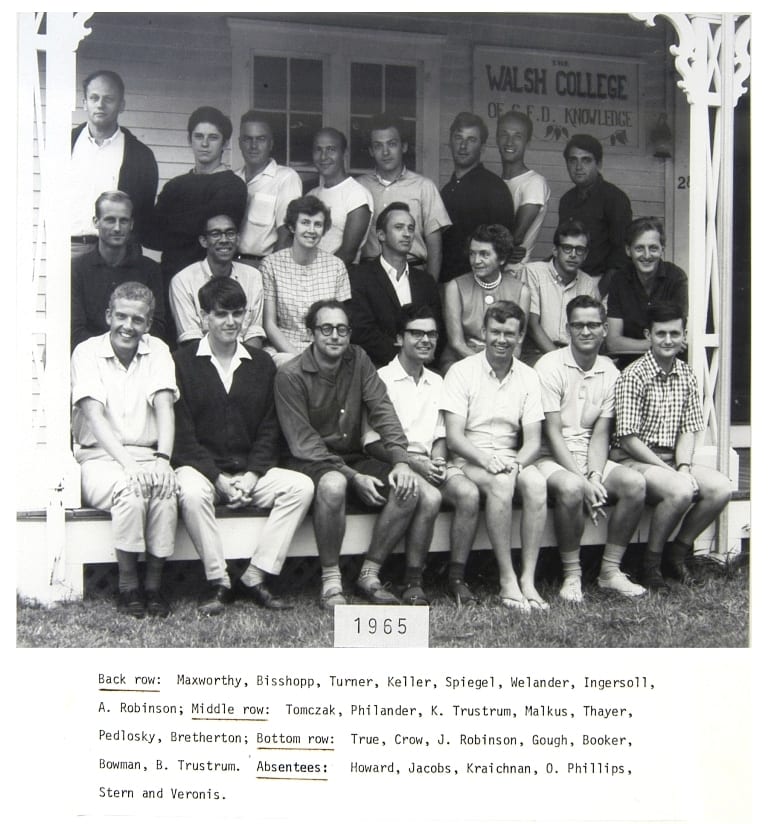
1965 Geophysical Fluid Dynamics Program Staff
News Release Image
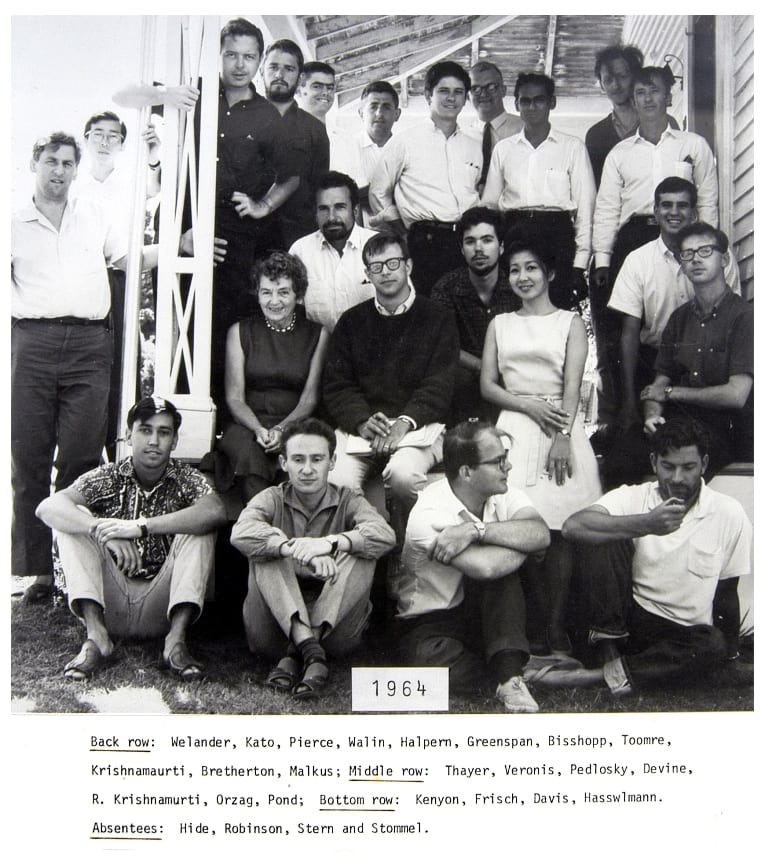
1964 Geophysical Fluid Dynamics Program Staff
News Release Image
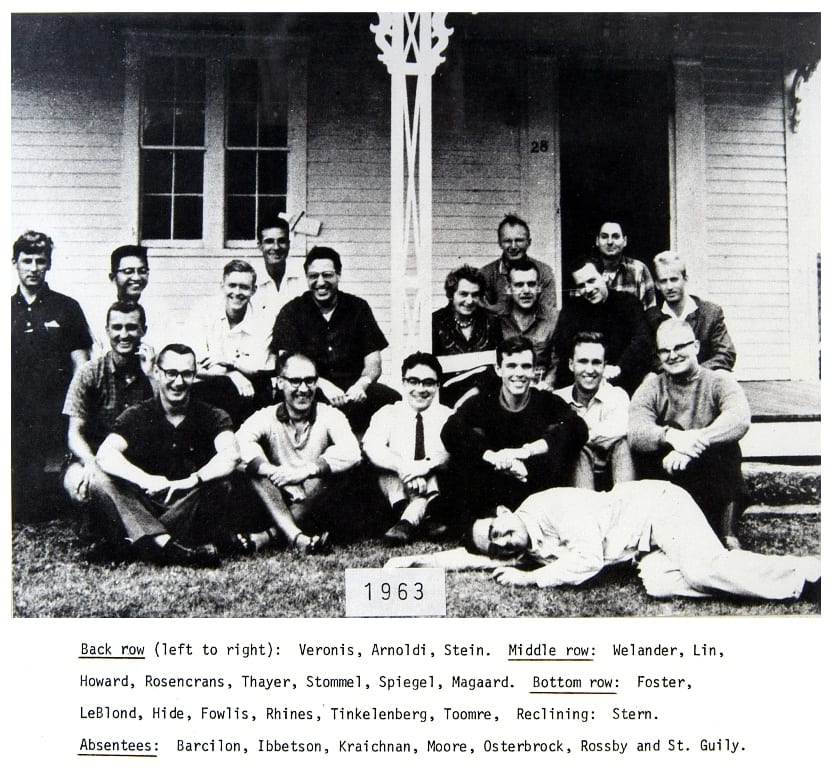
1963 Geophysical Fluid Dynamics Program Staff
See Also
- Geophysical Fluid Dynamics Program (GFD)
The GFD Program began in 1959 at the Woods Hole Oceanographic
Institution with the aim of introducing a then relatively new topic in
mathematical physics, geophysical fluid dynamics, to graduate students
in physical sciences. - Geophysical Fluid Dynamics Laboratory
- Life at GFD:For over four decades, a porch in Woods Hole has been a place for science
- American Geophysical Union
